#And Luigi is the most important person in the world absolutely
Explore tagged Tumblr posts
Text
I completely understand the hatred for Sticker Star now. If the last Paper Mario game I had played was Super Paper Mario when it came out and I had to wait five years for STICKER STAR? I WOULD OF BEEN MAD AS HELL TOO
#HOLY SHIT THAT WAS A GOOD GAME#MY GODDDDDDDD#no it’s fine I’m normal#that was. really beautiful. all of that#Dimentio can catch my fucking hands. I’m so glad blumiere and timpani got their happily ever after. oh my god#And Luigi is the most important person in the world absolutely#my god to think sticker star was the game after this. where luigi is relegated to background Easter egg.#I would of been so pissed I get it now#if I go on a reblog spree it is not my fault the game was just too good#mario bros#super paper mario#Starry speaks
10 notes
·
View notes
Text
im kinda thinking about bowser being a simp and i cant help but think how would that translate to luigi?
im not gonna take the movie's plot into consideration, but i will be using bowser's characterization as a starting point.
so, we know bowser is a simp for peach, and a big one at that. his style of showing affection is not only loud but downright aggressive, and while it absolutely fits him, it didnt work on peach and definitely wouldnt work on luigi. so where do we go from here?
i'd imagine they start off as begrudging friends. bowser still loves peach, but he doesnt want to shake the peace that has been established. and most of all, the rejection still stings and he's being sorta lost and mopey. luigi, having a heart too kind for his own good, hangs around the koopa king offering his comfort - and while he isnt too keen on having the younger mario brother buzzing around him, its better than being alone.
over time, he gets over the rejection. he is able to form a genuine friendship with peach (with no resurfaced feelings!), and even mario sees him more as a sports rival than a threat nowadays, allowing for some light-hearted banter. when those two toad-heads announce their relationship, bowser is genuinely happy for them. luigi, in the meantime, really grows on bowser as a friend. he invites the plumber over to his castle regularly to spend time together, conversation flowing naturally between them. when he's with luigi, it's so easy to forget about the world.
physical affection, too, starts becoming the norm without either realizing it. it starts off small, simple fist bumps and head pats. laying an arm over the other's shoulder to pull them close while joking, hugs hello and goodbye. eventually, they sit together, sides touching, bowser's tail curling around them.
it's during one of those sit-togethers that bowser first realizes his feelings for the plumber. luigi is fast asleep, cuddled up to bowser's side without noticing, and the koopa king is nothing but enamoured. as he goes to gently pet luigi's hair, he freezes. since when was he so gentle with him? since when were they so close? what he was about to do was something he did for his children often, but they were his family. when did luigi become part of that circle? it left him wondering about what to do.
bowser is loud. he is confident, he is shameless. if he likes someone, they will know. but peach hated his aggressiveness, and luigi would like it even less. so how could he show luigi he loved him without overwhelming him? being subdued and talking around the bush is not his style, but for his new beloved he'd find a way to be true to himself and honest at the same time.
from that night onwards, bowser approaches their interactions differently. he is more openly affectionate, not just in the way of who he allows to see them be affectionate but also what types of affectionate gestures he shows. he cups luigi's cheek, he nuzzles his snout into his head. their hugs become longer and tighter, he freely purrs when luigi runs his fingers through his hair, he gives him flowers. he rushes to pull out the chair when luigi's sits down at the dinner table, and he has his private study adjusted to fit luigi's sensory needs and allow him a space to relax and make his own. bowser is so obvious in his affections that the troops and caste staff start saluting luigi as if he were a person of importance in the castle (much to his confusion).
luigi, as touch starved as he is, takes the new affection in stride. he doesnt realize what it's supposed to mean, but he loves the way bowser is becoming so comfortable with him. he, too, opens up in turn, and it becomes hard to believe that he once lived a life without someone so important to him.
luigi's realization happens a while later than bowser's. the koopa king was asleep on the floor, belly down and head in luigi's lap, with luigi running his hand through the king's hair. it's in that vulnerable position that he comes to terms with his feelings for the koopa king, and he questions himself and their every interaction upon it. the next day, when bowser makes another big gesture of affection towards him, is when he realizes that bowser feels the same way, and has been telling him for a while. when luigi reciprocates, romantically, bowser cannot stop his tail from wagging hard.
and that's where it continues. bowser is still loud and obvious in his affection for luigi, but he makes sure that it is private, for them, and luigi appreciates it immensely. peach, observant as ever, knows immediately when things changed between them, whereas mario stays oblivious until they officially announce their relationship. he is supportive tho (you know, im not even surprised. if anyone can tame that overgrown lizard, of course it'd be weegie).
#bowuigi#luigi#bowser#bowser x luigi#fic idea#the super mario bros movie#they are just so cute together#mario#princess peach#kinda longer than expected im sorry but not actually
580 notes
·
View notes
Text
Okay, ever since the concept art of the Mario Brothers movie got leaked on Reddit, I've been wanting to make this post. And I think now is the time. Gird your loins friends. I am about to overanalyze the hell out of thirty seconds and one concept art of a movie.
A Room of Their Own: An (Over)Analysis
To start with, I want to justify this whole treatise by comparing the concept art of Mario and Luigi's room with what we get in the movie.
Concept Art
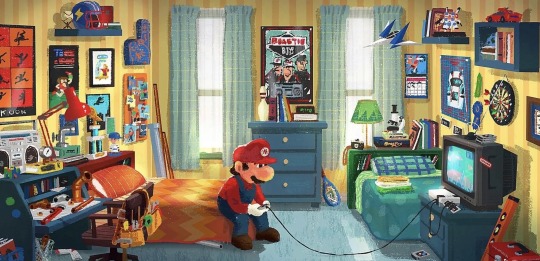
Movie
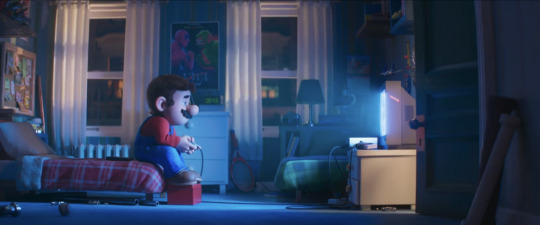
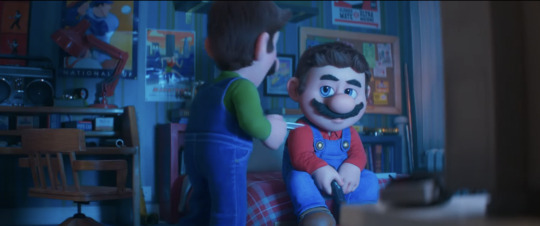
These match up incredibly well. There are a few poster swaps on Mario's wall, the generic baseball team versus an obvious reference to the Mets (a point I'll talk about in a moment); Beastie Boys for the fish person poster (and it's bugging the hell out of me, because the green guy is wildly jogging my memory and I can't quite place it). Luigi's side of the room also gets slightly rearranged, although the objects are mostly the same, minus the swap of the anime mecha figure for an art mannequin.
Now that we've established continuity, let's talk about why we're exploring this in the first place.
I love analyzing people's living spaces in media. They tell such an intimate story about who a person is, what they value, what they're hiding, and so on. And the snippets we get of Mario and Luigi's room, both through the movie and the concept art, say so much about them and (arguably) connect in some measure back to the games and even the cartoons of my youth. So, let's dive in, shall we?
Mario
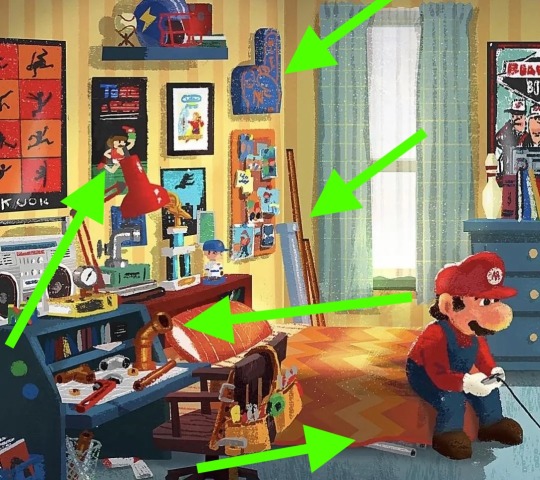
In both the concept art and the movie, a couple of themes emerge from Mario's side of the room.
Plumbing
It's obvious that Mario's passion is plumbing. There are pipes sticking out from under his bed, pipes stacked in the corner, books on plumbing stacked on his desk, along with all kinds of other related paraphernalia. Regardless of Spike or his father, Mario seems genuinely into plumbing as his vocation (remember, he was the one who was the driving force behind that commercial). Keep this in mind for when we talk about Luigi, because there's a divergence there.
Sports
We know from the movie and general lore that Mario is quite athletic, and seems to enjoys sports. Here, we see posters for baseball and what is presumably the New York City marathon (at least in the movie still); we see a football helmet and some small trophies that one might assume are related to his own sports activities. Is he the absolute, number one winner in all of Brooklyn? Unlikely, given his insecurities about always being "small," about wanting to amount to something. This being said, it's obvious he has some prowess and accomplishment in the world of sporting, perhaps on a high school level. And the whole parkour scene shows that he trains, keeps himself in shape for this type of thing. (As an aside, can you blame Luigi for not being able to keep up? Forget the knees, he's hauling a 15-20 pound bag of plumbing equipment with him! Give the guy a break).
Anyway, this is all unsurprising for our hero archetype. The marathon poster - grit and determination. Baseball and football - all-American sports. Central casting, call one wannabe hero. (Remember, what people showcase in their rooms is generally what is important to them, what they value).
There is a small wrench thrown in here, however (ha! a pun!) And that would be the foam finger featured in the concept art which is a very familiar orange and blue. And that along with the baseball figurine and posters - which have similar coloring and iconography of the intersecting "NY" - lead me to believe that Mario is a Mets fan.
Now, I need make a small digression here to explain why this is important to his character.
The Mets are the long-suffering little brother to the perennially-successful New York Yankees (booooooo). They still hold the modern era record for most losses in a season (their inaugural year, 1962, where they went 40-120). Over the decades, they have been plagued by inept ownership, catastrophic end-of-season collapses, and bizarre events that can only be categorized as "LOLMets." (This Reddit thread is a particularly entertaining history of the franchise's tragi-comic moments).
And aside from being a lifelong masochist fan of this team, I think it's important to bring this up in terms of Mario's character because he sees himself as the underdog while in Brooklyn; as little, as constantly underachieving. It's extremely fitting for Mario's movie depiction that he roots for the eternal underperformer, for a team that has historically been supported by the more blue-collar areas of New York, a fanbase which suffers year after year and yet always comes back for more.
Mess
This is actually my favorite part of Mario's section. Canonically, Mario is a kind of a slob. In both the concept art and movie stills, we see plumbing bits and parts strewn all over the place, pipes shoved underneath the bed, pipes stacked in the corner, half-finished projects and tools running amok his desk. (Note, he's not dirty, just disorganized).
And the thing, this isn't the first time we've seen evidence of this. Luigi, on two separate occasions, either complains about or encounters his brother's habits in the Luigi's Mansion series. (Although the first quote below could be more of a commentary on Luigi's persnickety-ness rather than Mario's laundry habits).


(seriously, Mario. Just how many pizzas did you need?)
There's something...I don't know, endearing or somehow fitting that the titular hero of the Mushroom Kingdom is a domestic disaster. Almost as if whatever energies he can muster are focused solely on hero-ing and plumbing and anything else just...falls by the wayside. (Understandable. There's only so much all of us in our lives have energy for. You have to prioritize). Still, it sets up this contrast between the front Mario puts up and how he's received by the Mushroom Kingdom and who he really is, which he definitely reserves for a select few closest to him, the prime candidate being his brother.
And speaking of that brother...
Luigi
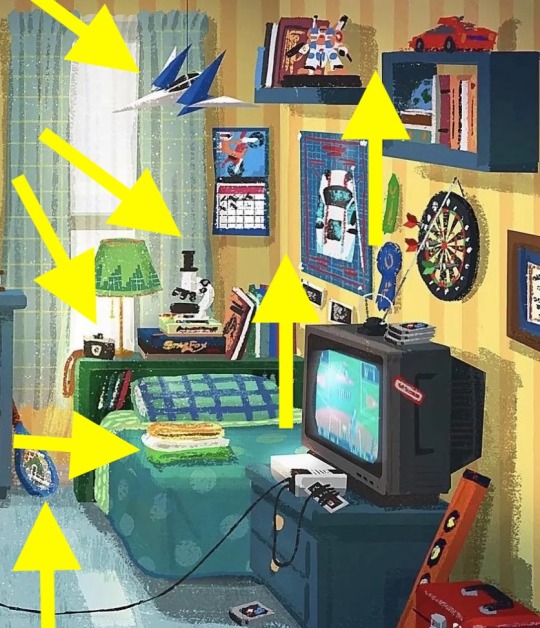
It's unfortunate that we don't get as many quality shots of Luigi's side of the room in the movie, but from what can see, the concept art is pretty consistent with the film.

And I'm being adamant about the consistency of the concept art and the movie, due to the fact we get so little Luigi screen time and yet his room tells us so much about him.
Science
We've got a tech-mech boy here, my friends. Note the somewhat advanced microscope perched on the headboard, the calendar of the motorcycle, the schematic of the racing car, the little jet-rocket ship. Note, in the concept art, the mecha sat prominently on top shelf.
Now, what does this tell us? (Aside from the fact Luigi is a total nerd, which we knew already).
Firstly, Luigi is very into motor vehicles, science (fiction), and possibly robots. That he possibly has some interest in engineering and robotics. This may sound familiar.

Yes, the Super Mario Brothers movie, by intent or not, kept Luigi's mechanical engineering interests intact. (There's a whole other post in here where I could provide further proof of this outside of SPM. I suggest watching the SMB 3 cartoon episode, "Mind Your Mummy" which not only wildly showcases Luigi's engineering skills, but is pretty hilarious).
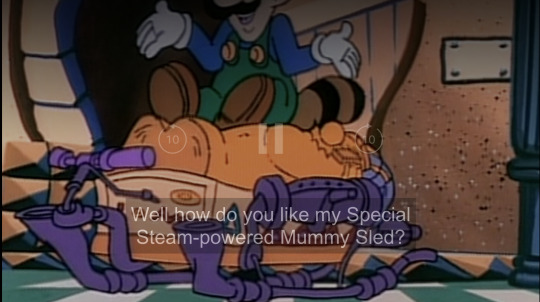

But I digress.
Here's the interesting contrast. Mario is obvious about his passion for plumbing. Luigi, although canonically more reserved, does take the effort to highlight what is important to him in his room - namely his interest in science and engineering (and photography, which we'll talk about in a minute).
It makes you wonder...Luigi is not a confrontational sort. He goes along with what Mario does because he loves his brother and perhaps he either doesn't know what he wants or is afraid to express it. I personally doubt Luigi's true passion lies in plumbing, from what we see here. It's a means to end.
Now, whether Luigi disavowed engineering due to finances, low self-esteem, family pressures, or if he just wasn't ready to declare who he was...we don't know (I would posit it's some tasty combination of all of the above). But I do feel like it's fair to say Luigi is along for the ride at this point. He loves his brother, is possibly a little too dependent on him. It's not like he's bitter about it (well, on the surface. The Mr. L persona raises some interesting questions) - he's just doing what Mario does because...that's what he's always done. Luigi hasn't found his true footing yet. (You can even look at the fact he carries the toolbag throughout the movie as a kind of metaphorical weight of Mario's interests and goals over his - which, I realize, for a Mario property, is a reeeeeaaaaal stretch. But since I'm overanalyzing three stills from an animated movie about video game plumbers, I might as well go for the gold).
The other aspect of Luigi's interest in fast cars, fast bikes, and fast rockets is how that contrasts with his reserved nature. Luigi is, supposedly, the scaredy cat, the one who won't take risks. And yet what we see fascinating him the most are chunks of metal being hurled through time and space at ridiculous speeds. Wish fulfillment? Or maybe another side of Luigi that even Mario doesn't always get to see.
We also see two ribbons pinned to the wall near the sciency/tech items. Most likely, this had to do with academic achievement I would bet good coins that these achievements were in STEM. Again, Luigi is showcasing this, meaning it's important to him.
In this context, him gravitating towards E. Gadd and his experiments is wholly in-character, despite Luigi's (understandable) anxiety about dealing with undead (but does he say no? Much like his rocket cars, there's a kind hidden recklessness to his character). Mr. L and his robot obsession (and skill) make perfect sense. Luigi's probably been looking for that kind of outlet for quite some time. I can pretty firmly state that the engineering aspect of Mr. L was not brainwashing and it makes you wonder if the other facets of Luigi's personality that rise to surface during that whole episode were planted or there already, just suppressed.
Cleanliness is Next to Godliness
Luigi is just a bit of a neat freak. We see this in the hat-cleaning episode referenced above, in the way his side of the room is somewhat meticulous in its organization (in contrast to his brother). He also has a few hilarious quotes in the original Luigi's Mansion that are worth including here that really highlight this side of his personality:
Now that I look at it-- it's full of moth holes! Yecch!" "So much dust! This will never pass the white-glove test!" "Well, they sure did pile odds and ends everywhere… Filthy." "I should probably give that a quick vacuuming…" "Oh, what's this?! Just how I like it… Nice and clean!" "Do Boos wash their faces?"
And what I find interesting about this tendency toward order is how it relates to Luigi's anxiety. I would argue that part of his clean streak is an attempt at controlling his environment, a way to counter that ever-present anxiety. It also seems fitting for the engineer to be far more fastidious about things being just so. Yes, it's a bit of a stereotype - a trope, if you will - but one that might have some teeth in this situation. After all, if you're building race cars that go ridiculous miles per hour, there's no room for error. I think the contrast between the two brothers - Mario's outside world is consistently on the edge of chaos while Luigi's inside world is the one on the precipice - is fascinating.
Sports
Now, it's not like Luigi has zero athletic ability (despite his complaints). We see a tennis racket in his room and a dartboard. He helped Mario beat up Bowser with zero training montage. It's just that Luigi seems to gravitate towards athletic endeavors that require more pinpoint accuracy (not that baseball and football don't, but it's a little different in my mind) and that avoid almost all risk of physical collision. Again, those interests are not what we think of as "stereotypical" of the big hero. And Luigi is a hero, but in a very different way than his brother.
Camera
I don't have too much to say about this one, but I think it's delightful that Luigi owns and uses an old-school camera. We can actually see two black-and-white photos pinned to his wall in the concept art, showing us Luigi's more artistic side, which is kind of neat (and let's not forget the movie subs in an art mannequin for the mecha, which only strengthens this notion of art interest. Maybe he's into the notion cybernetics? It's possible). I suppose I could read into camera thing as an observer vs. participant dynamic (Luigi behind the lens observing while Mario is always in the action), but I wouldn't make an argument any more in-depth, and even that statement is a bit of a leap in a document chock-full of leaps.
Conclusion
If you're expecting a thesis out of this, I'm sorry to disappoint - I don't really have one. I suppose this whole rundown is more of a literature review than anything else, but what I do want to stress is what can be read from the objects in the room and their placement. I can't and won't pretend to know the intentions of the artists here. It's very possible there was far less thought put into the design and layout of these rooms than the long treatise I have just given over to it. This being said, because there is a fair amount of consistency between the concept art and the movie and because there is a fair amount of subtle character moments throughout the film (which have been broken down by other intrepid Tumblr friends), I might lean towards the notion that these design choices do have some degree of intent in subconsciously shaping how we, the viewer, read the brothers.
(And yeah, maybe I just wanted an excuse to pin more evidence onto my "Luigi wanted to be a mechanical engineer and is actually really skilled at robotics and other science" conspiracy thread bulletin board :D
#hello there#luigi#mario#meta#in which i overanalyze the hell out of a piece of media#and give myself an excuse to not only promote my luigi-engineer agenda#but also talk about baseball for a paragraph#hahahaha#self indulgent nonsense#smb movie#you guys asked for it
184 notes
·
View notes
Text
Head Cannons!
So, I wanted to put out some general head cannons about the character’s personalities because why not? Luigi -He’s a soft boi but knows what he wants when he wants it and is willing to do what it takes to get it. -He’s the prince of the mushroom kingdom because Mario and his adoptive parents didn’t want him to have to stress about having too much work since he was frail as a kid. He no longer is, but it’s just how things turned out. -Luigi has a little bit of trauma from his time with Daisy. Of course things turned out okay and it was only temporary, but he won’t even look at her for things that she said and did to him over that day they were together. -Luigi sort of already knew that Bowser was hiding a big part of him. He’s not an oracle, but he occasionally has these dreams where he sees a small bit of the future and one of the things he saw was Bowser changing forms with Luigi in his arms. -He’s transgender, but genderfluid more than anything. His pronouns are He/him and he is comfortable being addressed as a prince, but he adores wearing dresses and skirts. He’s also generally more feminine in nature because of his kindness. No one judges him though, since he is the best ruler of the Mushroom Kingdom and if anyone did try to say something, they’d be facing war from Mario’s Empire.
Mario -Mario is the best older brother. Absolutely the best, he loves his little brother more than anything and when Luigi came out to him as young teens, he helped Luigi get more comfortable in his skin and helped when Luigi needed help picking a more masculine name. -Mario is not an emperor, yet! His father before him also wasn’t an emperor until after he married, so, potentially, if Mario chose to never marry but still have offspring, he’d never be emperor. Not that he minded, he was pretty content by himself. -Mario is Polyamorous! He is okay with just one partner, but he knows he needs more to be satisfied. That being said, he wants a closed relationship, he doesn’t want to have to worry about his partners getting sick because of a bad time or anything like that. -Mario is totally okay with Bowser and Luigi’s relationship and actually finds it cute! Interspecies relationships aren’t a problem for him since his and Luigi’s parents were one such couple. Their parents were a Toadette and a Bogmire by the names of Timpani and Blumiere respectively.
Peach -She’s a great girl :) the best girl and a great friend to Bowser. She never let his intimidating true appearance change her opinion of Bowser, even when he would get angry. She loves Bowser as a brother and has always cared for him and always will support him. -She becomes an ambassador for the Koopa Kingdom since she is really good at public speaking and negotiations. She doesn’t actually become a princess since she isn’t related to Bowser, but she is perfectly content with her position and is allowed to travel as she pleases between business meetings. -She isn’t exactly Poly, but she eventually ends up in a closed relationship with two people. She’s not the most active partner, but is a good compromise between their personalities and issues. She’s soft and kind, but knows when to put her foot down. She also appreciates aspects from both since one is responsible and doting while the other is strong and diligent. Peach loves both of them because they allow her to explore and be herself while still welcoming her back almost as if nothing has changed. -Peach can’t ever see her parents again, sadly, as the pipe never returns during their lifetime and her parents are left knowing that her and Bowser are either dead or lost somewhere. She regrets not calling them more often, but knows that she is much happier in this new world full of magic and beautiful scenery.
Bowser -Bowser has anger issues, but he does everything he can to keep from being violent or angry with anyone. He even commissioned a special room so that he could rage and not damage anything important in the castle. it’s full of easily made china, bats, punching bags, breakable boards, etc. He enjoys the relief it brings when he feel like he can’t control his emotions well enough. Luigi and Peach are also senses of calm for him, being able to ground him when he was starting to get mad. -He’s very uncertain with his and Luigi’s relationship at first, worried that their rushing it, but Luigi is quick to reassure him that he wouldn’t be there if he didn’t want Bowser. Luigi is also the first to initiate a kiss between them because he knows Bowser is too much of a worry wart. -Bowser adores Luigi as much as Luigi adores Bowser. He’s the first person to truly accept him and appreciate him in his true form besides Peach, and Luigi is the first person to actually like that form more than his human form. (Bowser wasn’t sure why until Luigi explained about his preferences later on in the relationship, but he was more than happy to oblige) -For whatever reason, even in Bowser’s human form, he and Luigi are never able to have a biological child. -Bowser is a righteous king and a good ruler and lover. He’s kind and knows when to step away while still being able to command respect and, when needed, fear, but he’s always looking to solve things peacefully.
Extras -Daisy is eventually tried and sent to an island that no one can reach once she’s there with only the basics to survive. She does eventually escape, but she no longer has any power and it took time for her to build herself back up to attack. -Waluigi and Wario become Bowser’s servants since they showed remorse for what happened. However, they aren’t allowed anywhere near Luigi because of his trauma. -Queen Rosalina, Queen of the Boos, does not like Bowser and thinks he is unfit to rule. -Donkey Kong, king of the Kongs, is a recluse and hides his people, however, when word reached him of a new, kinder Koopa King, he attended the coronation which introduced him to a new world of people. -Prince Boo, celestial being of the cosmos, is well known in the world and is both revered and feared. He was known to be chaotic, but only took real action when the galaxy is in danger. He enjoys teasing Luigi and eventually becomes a good friend to the human. Prince Boo does have a crush on Luigi, but for multiple reasons, he doesn’t pursue the human prince. -Koopalings for hire! They take the place of Wario and Waluigi and are basically hitmen or thugs for hire. Kamek recommends them for a simple retrieval mission and Luigi and Bowser both find the struggling kids cute and feel bad that they’ve had to live that way for so many years. They take the kids in a week after they get a very special present. Ludwig is the oldest at 17 and Larry and Lemmy are the youngest at 10. -The BeanBean Kingdom is ruled by Queen Cackletta and Prince Fawful, Their ambassadors, Bean and Peasley tried to steal Luigi’s voice to empower the Beanstar, but Prince Fawful heard of the plan and warned Luigi. Basically, the Super Star Saga plot takes place, but with altered characters and such. Mario becomes Rookie, Peach and Bowser are like Mario and Luigi, and Luigi is Peach ofc. That’s just how it goes lol. Things turn out great and Bowser, Luigi, and Mario are all able to acquire treaties with the BeanBean Kingdom. -Yoshi’s are more intelligent and have a kingdom and a super star of their own. Their king is literally named King Yoshi and is a rare Green Yoshi. -Penguins are sweet little babies that allow you to slide on them when traveling through their icy dessert hills. They are significantly larger than the ones we see in games and movies, since they are ridden, they have to be large enough to hold others. They love fish.
I have some other head cannons, but they will be answered in the fics I write for this. If anyone has any questions, I’d be happy to answer!
#Rearrangedau#Mario and Luigi#Mario bros#Luigi#Bowser#Peach#Donkey Kong#Princess Rosalina#Princess Daisy#Prince peasely#Koopalings#King Boo#Bowser x Luigi#Luigi x Bowser#Bowuigi#I love this au#Someone on AO3 asked me a bunch of questions so I answered some of them on here#There are a few unanswered or purposefully not finished#I have lots of ideas#I love these guys!#Pls ask me questions lmao I want to show what I've thought for this au
73 notes
·
View notes
Note
Are you the one who wrote 'A Jester's Lament'?
What inspired you to write it? (41 chapters!)
Oh no no no, I’d HATE to be that weirdo who wrote 400 pages worth of mario fanfiction! haughty laughter is then interrupted by 500 drawings of Lament Dimentio falling out of my pocket
Tbh what inspired me was. Myself? Weirdly enough? I mean of course SPM being my biggest interest was absolutely part of the reason why it’s so long and why I wrote it to begin with. But what specifically sparked the story of AJL was the fact there was an extremely specific type of Dimentio redemption story I was looking for. Of course, I’m not saying AJL is the first of its kind or something because it most definitely is not lmao😭😭 But there were just some things I preferred in an AU that tries to redeem Dimentio, and after searching for a while for, again, that extremely specific story, I thought, “DUDE JUST MAKE IT YOURSELF💀💀💀💀” and so I did. And a lot of people just ???? happened to like it??? :
Even though story length was one of my specific wants, I highly doubt I could’ve completed 41 chapters without the immense support I received. I genuinely cannot thank you guys enough. Seriously, if you like a fic, I highly highly reccomend commenting. You have no idea how much that means to writers 🤍
I’m putting this under a read more so I don’t clog people’s feed, but if anybody’s curious, some of my specific wants were:
- Length. I needed this fic to be almost unbearably long. I needed people to say GODDD DAAMMMNN when they looked at the word count.
- Dimentio somehow getting more unredeemable before he got redeemed (idk if I fully accomplished that, but I tried) (it’s hard to get worse than the complete annihilation of life) (I just tried not to purposefully write him in a likable way early on in the story)
- Dimentio dying the same amount of times he killed Luigi in the game
- Dimentio in general getting shit absolutely rocked
- Luigi not being a doormat, ESPECIALLY SINCE DIMENTIO ABUSED HIM
- DIMENTIO. BEING. IN. CHARACTER. THIS IS NOT JUST SOME SILLY GOOFY CLOWN!!! HE IS EVIL!!! HE TRIED TO KILL EVERY SINGLE ENTITY THAT HAS EVER EXISTED, DEAD AND ALIVE. HE IS SUPPOSED TO BE TERRIFYING AND SCARY!!! yes he’s naturally charming, write him as such, BUT NEVER FORGET THE THREAT HE IS!!!!
- Dimentio having a backstory that’s emo enough to explain the person he became but not emo enough to be his main source of redemption via pity if that makes sense. I think I achieved this? But of course that’s subjective, and looking back there were better ways to go about it. Basically what I tried to do is give him a good childhood with loving parents- minus the “accident” of course- and have Dimentio himself clarify in Chapter 15:

Basically: the loss of his family and the shit he went through definitely played a role. However, instead of a Blumiere-like ��My loved one(s) died, now all worlds are without meaning and deserve to be destroyed,” Dimentio’s grief triggered a very deadly greed that did not revolve around the ones he lost. Blumiere’s motivation for destruction, including himself, was purely the loss of Timpani. Dimentio’s motivation for destruction, excluding himself, was, well, himself. For once, Dimentio wanted to earn, not lose. Making Dimentio have an understandable backstory but be “less sympathetic” than his counterpart, Blumiere, was important to me during the creation of AJL. But this gets extremely complicated because something like hmm uh idk erm MASS MURDER is impossible to truly make sympathetic. Regardless of intention, Dimentio and Blumiere did the exact same thing. Regardless of intention, Dimentio and Blumiere were both selfish. You can’t exactly destroy life itself in a non-selfish way. Both characters are equally unredeemable (or… equally redeemable, technically). Strip their actions down for their bones, and all you’ll see is two characters that tried to ERASE EXISTENCE. Sure, you can FEEL more sympathy for one than compared to the other, but feelings are subjective. Facts are objective. And the fact is, Dimentio and Blumiere attempted mass murder. You see why this is difficult to explain and even more difficult to write? I have a headache. God speed everybody
- More shit I’m probably forgetting
- Picture of a cat I found

13 notes
·
View notes
Text
Super Mario Bros Movie Talk Part II: Princess Peach

Welcome to Part II of my Super Mario Bros. Movie Series. As promised, I will now talk about what is perhaps the movie’s most controversial topic: Princess Peach, or should I say the way she was depicted.
I did a poll asking for opinions on what others thought about Peach’s portrayal, and the results weren’t even close. It was clear most of the people who participated in the poll liked her movie version. What do I think of how Princess Peach was handled in the movie? Well, I'll be more than happy to answer that question.
I’ll start off by saying I absolutely adore Princess Peach. 😊 She, Mario, and Luigi are my favorite characters of the Mario series. To take it even further, she is one of my favorite fictional characters, let alone video game characters. She is an icon in the video game industry and holds the record for the most video game appearances by a female character and with the upcoming Super Mario Bros Wonder and her own game, that record will continue to increase. With all of this said, Peach is very polarizing. While she has a large fanbase (of which I am a part of), she also has a large number of detractors. The latter like to criticize her for always being kidnapped, being weak, having no personality, being a dumb blonde, and being overly feminine, just to name a few.😒 Needless to say, I wholeheartedly disagree with these sentiments. Although I could talk about each of these criticisms, the main one I’ll focus on is personality because it’s the most relevant to the topic at hand.
I have always said Peach is the most complex Mario character personality wise because there are so many directions in which her character can be taken. The game version of Peach is depicted as a sweet, kindhearted, playful, idealistic if not a bit naïve, and sometimes adventurous person who completely embraces her femininity. In other media, such as the older cartoons (The Super Mario Bros. Super Show, Super Mario Bros. 3, and Super Mario World) and the Super Mario Adventures comic, she is shown to be feisty, sharp-tongued, and not afraid to stand up for herself or take the fight to someone while maintaining a lot of her game traits. There are even some of these elements in the Paper Mario series, such as ordering Mario and Luigi to leave so she could deal with Mimi alone after the latter made a very rude and personal insult to her in Super Paper Mario. With some of these traits established, this brings me to her movie version.
I will admit I was concerned about her portrayal from the trailers, with the infamous halberd scene being the main one, for it appeared she would be the typical girlboss character that is depicted in movies nowadays. Nonetheless, I decided to wait and see the movie before jumping to any conclusions. To be honest, things didn’t start very promising with her judo flipping Mario then later bringing up Mario’s lack of size while letting him know how dangerous Bowser is. However, after the “he’s not important” scene, things got a little better for her. There were still some girlboss moments with her, but she wasn’t a complete girlboss. She still needed help with some things; in fact, despite being a capable fighter she knew she wasn’t strong enough to face Bowser alone, hence the reason she traveled to the Jungle Kingdom to try to recruit the Kong army. Also, she surrendered and agreed to marry Bowser to stop Kamek’s torture of Toad, which showed she had one major weakness: her unconditional love for the Toads. In addition to this, outside of their first few interactions, she wasn’t completely rude or condescending to Mario, nor did she try to show him up most of the time. According to speculation across the Internet, Illumination originally wanted Peach to be the typical competent girlboss who overshadowed Mario at every opportunity and make Mario a bumbling idiot for comic relief, but Nintendo stepped in and prevented that from happening (if true, I’m glad they did).
Another area of contention with Peach is her voice. Although opinions weren’t as contentious as they were about Chris Pratt’s voice for Mario, there were some concerns about Anya Taylor-Joy’s Peach voice. Samantha Kelly’s Peach voice is soft, high-pitched, and girly. Taylor-Joy’s voice was deeper and carried more weight. I believe in some interviews Taylor-Joy said the reason she did her voice that way was because it fit Peach’s character better in the movie. I can understand the reasoning; however, I felt that the voice would’ve been better suited for someone like Princess Zelda or Rosalina. I’ve even seen opinions that the voice would’ve been great for Daisy, but I can’t see it because Daisy’s voice is louder and more energetic. Having said that, as with Peach’s character, the voice grew on me as well.
When it comes down to it, if I had to pick which version of Peach I prefer, I would easily pick the game version. It’s just that her game version would’ve been unique with the way female characters are currently portrayed in movies. However, that doesn’t mean I dislike her movie version. While I wish she was more like her game counterpart, I’ve come to like this version of Peach as well. In fact, pianokantzart has a great post about the two Peaches and what makes them who they are. With that said, the one thing I hope doesn’t happen is Nintendo tries to replace the game version with the movie version. That would be a huge slap in the face to the fans who are fond of the game version. Let these versions be their own separate entities.
Well, this is a rather long post. 😂 It shows that Princess Peach is a character I am very fond of and have a lot to say about. 😆 I wouldn't mind reading any opinions as long as they're not rude or disrespectful.
#super mario bros movie#mario movie#mario movie ramblings#princess peach#movie princess peach#i absolutely adore her#i like movie peach although i prefer her game counterpart
7 notes
·
View notes
Text
My Thoughts on the Mario Movie
I just opened this blog and I'm stuck bored at the laundromat, so now seems like a great time to ramble. Will be getting into spoiler territory.
Just to give background, I literally grew up on this franchise. SMB3 was the first game I ever beat. My favorite cartoon was The Super Mario Bros. Super Show (if you can't tell by the blog URL). I started to write at 9 years old after stumbling onto a Mario fansite and being inspired. This was my introduction to fandom.
When I initially saw the movie, I had mixed feelings. I was floored when they acknowledged and even expanded upon the original story of how the brothers made it to the Mushroom Kingdom. Yes, they're just some guys from the real world, that's the point! They're just some guys!
For the negatives: The pacing is awful. They don't take long enough to pause on any one moment or expand on any point made. They immediately jump to the next thing each time. My boy Luigi barely got any screen time. The voice acting wasn't bad, but it wasn't great (but I can look past that). I'm still not a fan of the final fight taking place in Brooklyn because then that raises a lot of questions that aren't answered (How do the citizens of Earth react to a massive turtle dragon attacking the city??? Did this get news coverage??? Are we just handwaving this??? What????).
As for the positives on my initial viewing: Loved Bowser. They nailed his personality. I knew they would the moment they announced that Jack Black would be voicing him. I loved every moment he was on screen. Zero complaints. The casting of Charlie Day as Luigi was also perfect in my book (even if that one was more controversial for some reason?). It just... Fits. Anya-Taylor Joy needed better direction, but her voice worked well enough and you can tell she really enjoyed her role from the previews. Chris Pratt was certainly there but not as bad as I was expecting.
And the references! God. The references. The movie really looked at its older audience and said "Hey. This is for you too." (I'm hoping the blue toad with glasses was supposed to reference Toadbert, but that may have just been me hoping.)
But, as I said, my feelings were mixed.
Initially.
But then I thought about the movie more and more.
What's important in the Mario franchise is that the CORE is there. I'm not talking "giant turtle kidnap princess saved by plumber the end." I mean the brothers. It's Super Mario BROTHERS.
This was my biggest fear going into the theatre. Mario and Luigi actively care for each other in the games, first and foremost. They bicker sometimes. Luigi can get a bit jealous in some of the games. But in playing the games, it's explicitly clear: They care for each other. They'll protect each other. They'll risk their lives for each other. In the Mario&Luigi games especially, they're not afraid to comfort each other and show affection for each other. "Toxic masculinity" does not exist here.
My fear going in, especially Chris Pratt as lead, would be that this would be outright abandoned. This movie was produced here in the USA, and us USAmericans tend to be HIGHLY touch-averse, to the point of it being cultural taboo. It would have been far too easy for them to ignore or change their relationship to the more 'typical' depiction you see of brothers in media.
But.... no.
THEY NAILED IT. ABSOLUTELY NAILED IT!
The most important part of the series! THEY NAILED IT!!!
Mario and Luigi's interactions are PERFECT in the movie! That's them! As they should be! Constantly reassuring each other before they're separated! Mario standing up for and protecting Luigi since they were kids! Luigi insisting that Mario isn't bringing him down like their dad says! When they reunite! THE FOREHEAD TOUCH! They're on the verge of tears! They only care that the other is safe even though they're in the middle of a massive battle!
The pacing is awful. The voice acting is okay. I still don't like the final battle taking place in Brooklyn without showing consequences. But in the end, that doesn't actually matter to me! This is going to be an introduction to the franchise for so many people! So many new fans, so many kids, so many people who will grow to love it as I do, and the most important part is THERE! The movie is far from perfect, but that doesn't matter to me as much now!
Hopefully we get more of the brothers in the next movie (There's DEFINITELY a next movie). I am actively excited for what the first movie brought and can't wait to see it expanded. It's perfect for what it needed to be.
(Also Donkey Kong's "WELL YOUR DAD'S RIGHT" is the funniest subversion of that trope I've ever seen and had me in tears in the theater, gotta give credit where credit is due.)
4 notes
·
View notes
Text
Xicor: the Character Who Didn’t Exist (A Tale of the 90s Internet)
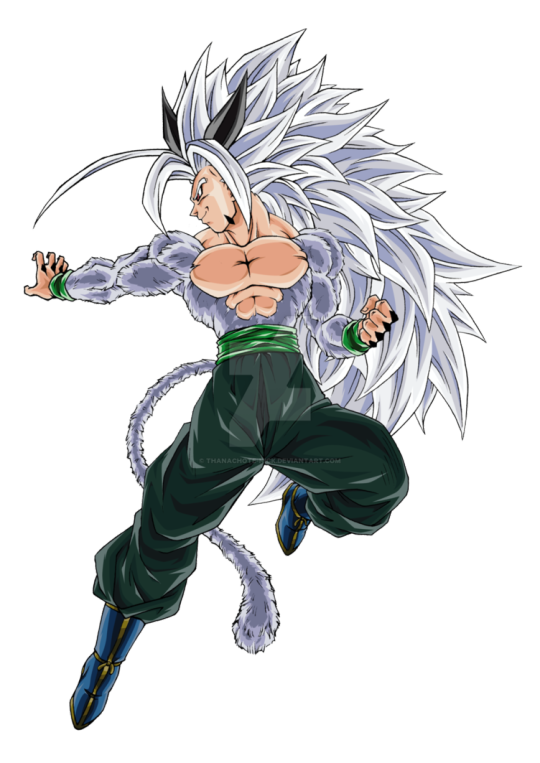
The most important and influential Dragon Ball Z character in recent times is a guy who never existed at all, and was created entirely by Western fans playing a garbled game of telephone in the early internet, where lies and insane rumors could flourish unquestioned. In 1999, everyone had “a friend in Japan” who told them the next great Dragon Ball villain in the upcoming series was going to be a silent, intimidating Ivan Drago-like albino bruiser named Xicor, who is half-Saiyan and half-god.

There is some precedent for this. In the 14th Century, a forged letter spread among the people of Europe. A powerful Asian Christian king, Prester John, who lived beyond the domain of the Turks, offered to aid the Christians of Europe against the Muslims. There obviously was no Prester John, he was a fictional person from a fictional country (and skeptical people probably should have guessed that from the fact his letter mentioned he owned a griffin and the Fountain of Youth), but the search for Prester John changed real world history, even though this guy never existed. If you like this story, read Umberto Eco’s Baudolino, my favorite novel about the beginning of the Renaissance.

To understand where Xicor came from, you have to understand that, in 1999, the great currency of the internet were lies and tall tales about fannish entertainment. Every single website had a “News and Rumors” section that passed on absolute unverified lies that were sometimes pulled from thin air or made up on the spot. There were no official sites releasing news and casting on new release movies and television at all. You often only knew a show existed when you saw a trailer or, at best, if it got a prerelease pictorial in Starlog magazine. And because sites were in competition, a weird unsubstantiated rumor posted in one place was quickly posted everywhere else in no time flat.
To be clear, we were not that stupid. We absolutely took all of this with a grain of salt and an eyeroll. When a Nintendo fan site mentioned someone’s story about how they found a way to play as Luigi in Super Mario 64, the reaction by most was to roll their eyes. Nevertheless, we kept on reading the News and Rumors, because sometimes, once in a blue moon, something would turn out to be true. It was kind of like the technique of cold reading in that people remember the one time someone got a real scoop, and ignored the 12 times they passed on weird, false rumors, like the idea that Episode I was going to have an R-rated version when it was released on home video (I don’t have time to go into it, but ask any Star Wars fan around in the run up to the prequels who SuperShadow is).
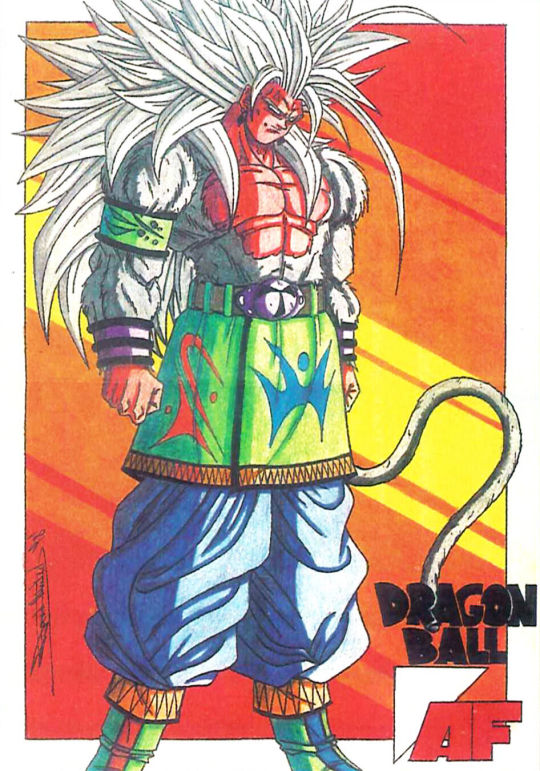
In 1999, Dragon Ball was the biggest anime fandom and it wasn’t even particularly close, but the trouble is, the show finished in 1997 and there was no indication more was coming. It’s not clear and probably never will be who started it, but there were rumors that, in Japan, there was a new sequel to Dragon Ball called Dragon Ball AF (After Future). Since then, “AF” is hip slang meaning “extremely” (as in “Frank is strong af”) but nobody used AF that way in 1999, making this extra-funny with the passage of time. A single piece of fan art showing an evil albino Saiyan in Super-Saiyan 4 (his albinism showed this was Xicor, not Goku in some new transformation as was sometimes believed) was passed around as “proof” this series was coming. Nowadays, we know this is just fan art. But the fact that this fan art has an albino Saiyan foe and has the title Dragon Ball AF, tells us that the rumors existed first and this fan art was made later, and in a weird cycle, the fan art was later used as evidence of the rumors, and so on.
These rumors got crazier and crazier because there was no official denial of any of this, because nobody was really on the internet, nobody official kept tabs on fan communities. In 1999, the only people on the internet were nerds talking about Star Trek and anime.
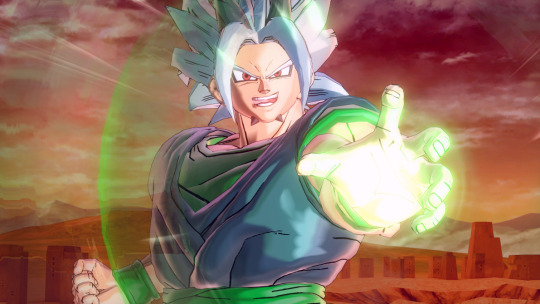
The interesting thing about Dragon Ball AF is that the rumors stayed pretty consistent on what the storyline was going to be. In other words, everyone hallucinated the exact same fake show into existence. I guess everyone had the same “friend in Japan.” The opening of the series was always described like so. Years after GT, a pair of pods arrive on earth, and two beings emerge: one, a beautiful albino woman, and the other is a massive, intimidating silent albino bruiser named Xicor. The woman, we discover is a former Kai, and Xicor’s mother, who works as the brain to Xicor’s muscle.
Now we start to understand exactly who Xicor is. He’s a secret son of Goku and the Western Kai (who faked her own death), making him half Kai and half Saiyan, or a Super Saiyan God. He’s essentially Sloth from the Goonies, in that he is a massively powerful, mostly nonverbal, monstrous and deformed third son, commanded by an evil mother (Mama Fratelli), who can throw everyone around easily when he really gets mad. Goku’s two earlier kids are kind of like the two less effective, squabbling Fratelli kids, I suppose. Instead of tearing off his shirt to become Superman when enraged, Xicor became an albino Super Saiyan 4.
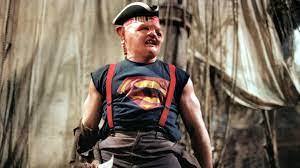
If you’re a long-time DBZ fan, you’ve seen the DB AF hoax image of Xicor so many times that it probably makes you pissed to see it now. Every 5 years, a rumor starts up that someone is going to do Dragon Ball AF “for real” this time, and it’s wrong every time…or is it?
This should be where the story ends, right? A crazy rumor from the wild west days of the fan internet created by wishful thinking. Alone, it would just be a story about how crazy the 90s internet was. But here’s the thing: the story didn’t end here, because that’s the thing about rumors. People wanted Dragon Ball AF to be real so badly they created dozens of fan comics about it. And because there were all these rumors that were weirdly consistent, a true oral tradition right out of pre-writing cultures (or like those filthy rhymes we all learned at summer camp that have no point of origin, like “I’m Popeye the Sailor Man, I live in a garbage can”), the details of Xicor (albino, red eyes, wears green and shoots green lasers, silent, half god, Goku’s third superpowerful evil son, bossed around by an evil mother) stayed the same.
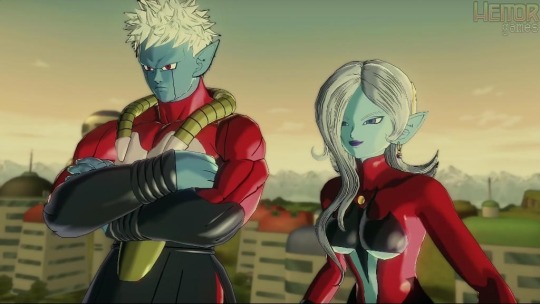
The story of Xicor didn’t end here, because a funny thing happened; the guys who were big fans in the 90s started to run the asylum. That is, fans started to be put in charge of Dragon Ball Z. One person who made DB AF fan comics (and the idea of a “fan comic” of which there is no original is very funny to me) was Toyotarou, a fan comic artist. He was asked to do creative for the video game Dragon Ball Xenoverse. And…who were the villains of Dragon Ball Xenoverse? Mira and Towa, a mother-son pair of evildoers where the mother is the brains, and the son is a silent Ivan Drago-like bruiser who was pure intimidation.
The following is a fan comic done in 2000 by Toyotaro, the guy literally making Dragon Ball Super now:

By the way, in case you’re not convinced Mira and Towa were inspired by Xicor, here’s a look at Mira’s final, albino and beastlike form in Xenoverse 2:
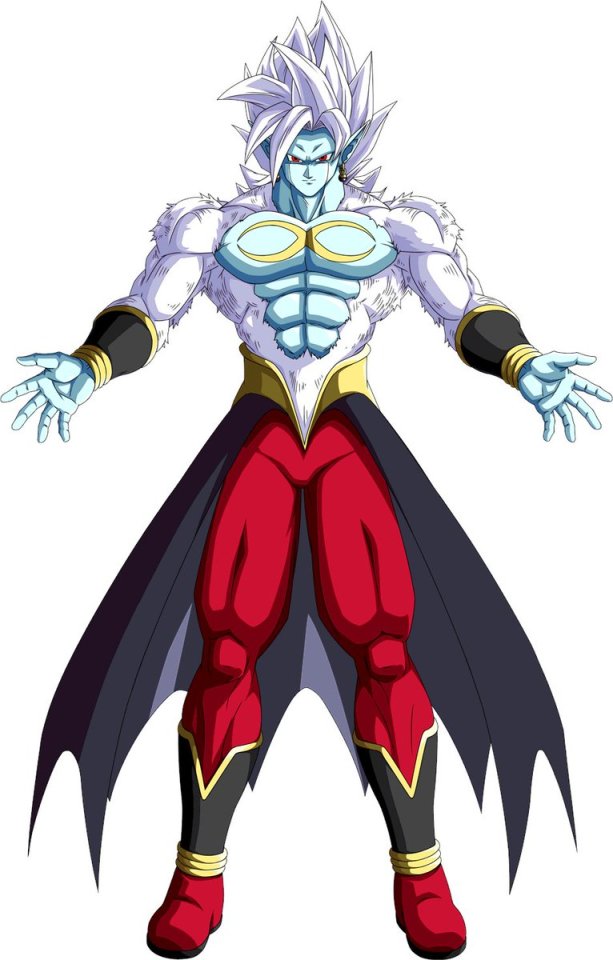
It gets better. Traces of Xicor, a character who never existed in canon, are everywhere all over the DBZ revival, Dragon Ball Super, which is essentially a canon Dragon Ball AF. It’s as if fan desire wished the series into existence. When I first heard the title, Dragon Ball Super: Battle of the Gods, my immediate assumption was that they were making Xicor canon and the villain (side note, but my initial reaction on hearing the premise of Star Trek Nemesis back in the day is that Tasha’s daughter Sela was going to be the villain). And he wasn’t, but they canonized the existence of Super Saiyan God. In other words, the instant fans got the keys to canon, they made Xicor real.
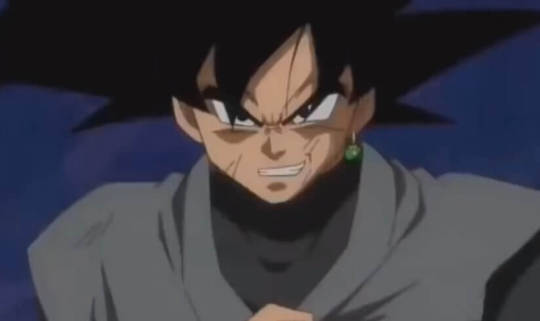
It gets better. In a later DBS arc, there is a villain who is made from both Goku and a Kai, Goku Black, who is tremendously powerful for that reason. I guess the reason they went with Black is because Goku White would have suggested Xicor a bit too much! (Also, I wonder if the humorous viral clip would have been funnier....or less funny....if they said “don’t shoot, he’s not white!”) Personally, I think Goku Black would have been more intimidating if he didn’t speak, like the taciturn and laconic Xicor.
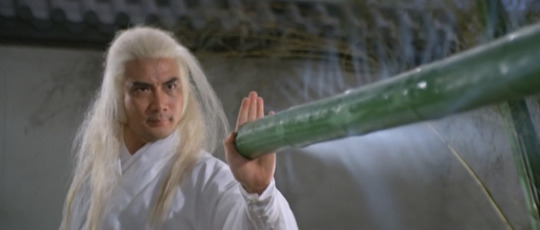
Interestingly, all this is a case of everything coming full circle. As I’ve written before, Dragon Ball was inspired by Chinese martial arts novels and shows, and the most popular martial arts series from China in Japan the year Dragon Ball was created was Bastard Swordsman, which inspired the Super-Saiyan transformation...except it turns you albino-white.
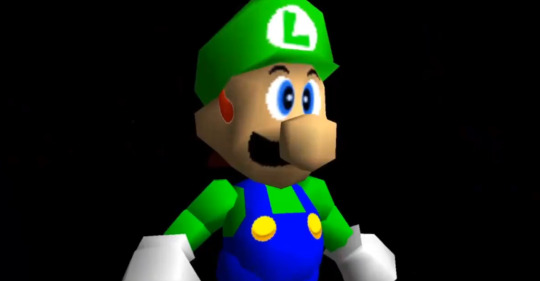
I’m not sure how to end this neatly except to bring up one thing: remember when I said the most annoying and persistent 90s internet rumor was that Luigi was somehow in Super Mario 64? Well...astoundingly, last year, a dump of Nintendo files leaked, revealing that Luigi was designed for Super Mario 64 all along. Xicor became real in every way but name, and Luigi was in SM64. Even SuperShadow’s insane prediction about Star Wars sequels came true. It’s like...the 90s internet rumors were right about everything, you just had to wait a couple decades.
698 notes
·
View notes
Text
(Some) Greek Gods as Historical Figures
So some days ago I secretly logged back into Mythology and Cultures amino and I stumbled across post of casting historical figures as the gods from Greek mythology. Of course, I hated it, so I made my version of this.
Note: Of course, this is going to have quite a lot of Napoleonic figures, since I am more familiar of this period, but please do reblog this post (or tag me on another post) with the hashtag “#mythical figures as historical people” and add some more of your historical figure Greek God fancasts!
Note 2: this post is for entertaining purpose, and just me introducing some guys to y’all and I am not a historian myself and hopefully you all would still like my takes😅
1. Zeus - Louis XIV of France
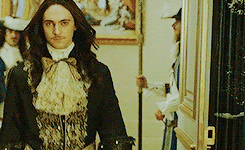
First and foremost, I shall introduce the king of gods featured in Greco-Roman myths. You may ask, why don’t I cast Henry VIII of England? Well, my reason is very simple: Henry is far from accurate to Zeus in actual myths.
To be honest, Zeus has a more “absolute power” energy in it, and Louis XIV totally has rocked it (like that iconic line “l’état, c’est moi (I am the state)”). Well, Henry also has that kind of energy but everyone only remembers his six wives and the uncountable number of bloodshed (not to mention Catherine of Aragon is a much better fighter than him—got this from Horrible Histories OwO)... Anyways, Louis XVI is basically a Zeus.
2. Hera - Catherine of Aragon

This brings to Catherine of Aragon herself. She’s a total Q U E E N and if you have watched “Six” the musical you already got what I mean (like, being the wife who married to Henry the longest). There’s also the early warlike aspect in Hera (featured in Homer’s works) that Catherine has it as well (at least you know that she’s getting more victories than Henry if you have watched Horrible Histories season 6, in the episode with Rowan Atkinson playing Henry VIII (which is sad because I want Ben Willbond to play him—he iconic to the HH fandom)), making her a great casting of Hera.
Hera, in my opinion, is a very strong woman who has to take Zeus’s shit and I could totally understand why she took revenge on the girls that Zeus has slept with—but anyways, hopefully you guys would like it :3
3. Aphrodite - Pauline Bonaparte
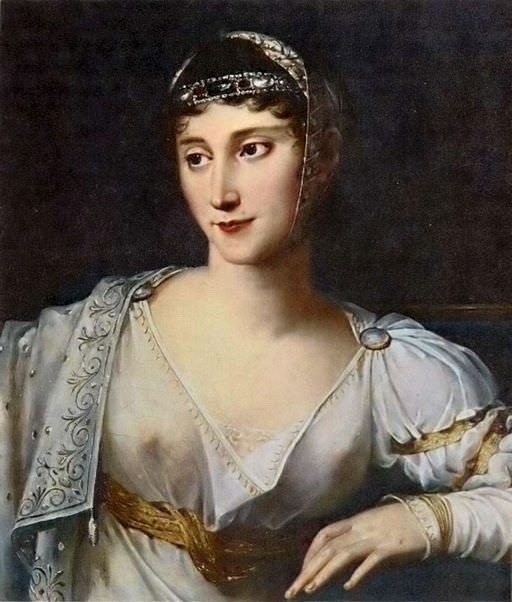
This is half-self-explanatory, really—just look at that statue she posed as Venus, the Roman equivalent of Aphrodite.
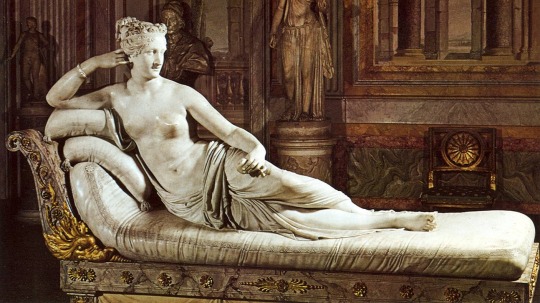
Pauline was famed for her beauty in her time, also a big chunk of scandals from her affairs (which bugs her big brother Napoleon, a lot). Nevertheless, despite her big spending habits and a great sexual appetite, she always helped Napoleon in some surprising ways (like she sold her house in Paris to the Duke of Wellington to get the funds for Napoleon).
Just like Aphrodite herself, Pauline harnessed her beauty very well. Thus, I rest my case.
4. Apollo - Joachim Murat or Emperor Franz Joseph I of Austria
(Warning: long content ahead)
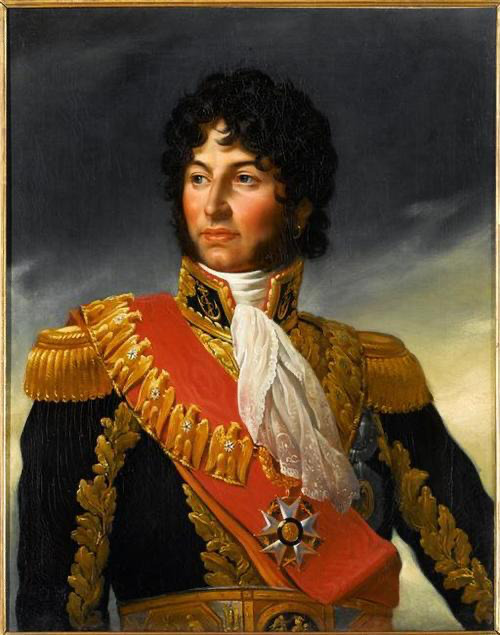
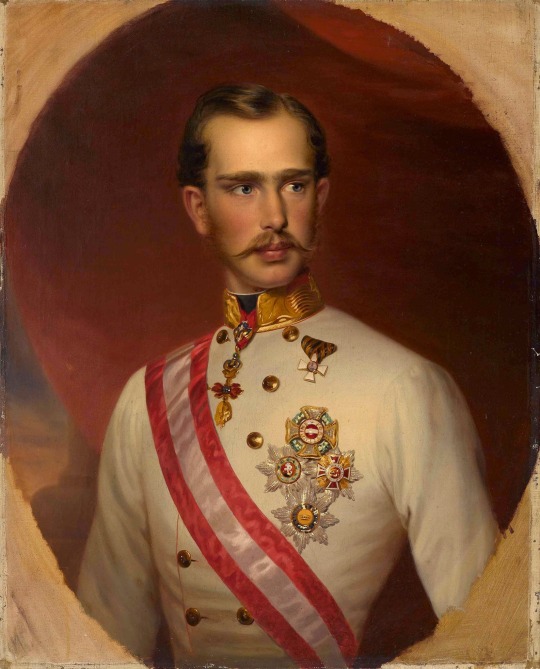
Firstly, let me briefly introduce them because you guys might not know them much.
Joachim Murat was a marshal of France, also one of Napoleon’s brother-in-law, grand duke of Berg and Cleves from 1806 to 1808 and the King of Naples from 1808 to 1815. After the wars, he attempted to escape yet was caught and executed in 1815 in Pizzo, Italy (if you have read of Alexandre Dumas’s “Famous Crimes” you might know him—by the way no one has cut his head off and sent it to that big nose King Ferdinand).
For those who have watched “Elisabeth” or the “Sissi” movies, you might know Franz Joseph I of Austria already but you might not know much about himself besides being the husband of the (in)famous Empress Sisi (ie. Empress Elisabeth of Austria). He was the Emperor of the Austria from 1848 to his death in 1916—one of the longest reigning European monarchs in history. During his reign, the empire had been through a lot of change, most notably, the creation of Austria-Hungary. Nevertheless, he was also the Emperor who started World War I and he died of old age in the midst of the Great War.
For Apollo, I’m not casting musicians because this is quite overdone. I rather want to shed a light to the other arts that he represented in Greco-Roman mythology. This makes me want to draw a parallel to Joachim Murat as he was also a great sucker of classical literature. Plus, he also was known to be a flamboyant dresser (his nickname was “the Dandy King” by the way), also the designer of the uniforms of the Neapolitan army (with an excessive amount of amaranth, perhaps his favourite colour). Really, everyone just sees him as a great flamboyant himbo but in reality, he’s iconically badass in the battlefield as the First Horseman of Europe. Well, also he’s known for being extremely good with women even though his wife Caroline was fierce as hell. So, in my opinion, he fits the image of Apollo that we know.
However, you guys might feel surprised why I picked Franz Joseph for Apollo. Well, he really... was a rather mediocre ruler in my opinion, and perhaps our most memorable image of him was the senile emperor who signed the declaration of war to Serbia. Nevertheless, he was a well-liked man among his subjects, at least to some old citizens of Austria-Hungary telling future generations. Besides, culture flourished in Vienna under his reign—with notable figures like Sigmund Freud, Ludwig Wittgenstein and Erwin Schrödinger. Despite the series of unfortunate events which made the empire started to crumble, Austria-Hungary arguably has its cultural importance in Europe. Sounds like what Apollo would do if he’s a ruler, somehow.
Well, enough of his political achievements, let’s talk about his private life... which was probably the actual reason why I picked him.
Enter Duchess Elisabeth in Bavaria, the Empress of Austria and Queen of Hungary, also known as Sisi.
On a side note, Marshal Louis-Alexandre Berthier of France, Prince of Neufchâtel and of Wargram, was Empress Sisi’s grand-uncle in-law via his marriage to Duchess Maria Elisabeth in Bavaria

Absolutely love Pia as Elisabeth in the musical so please don’t mind me using a gif from this :3 ((also, “Elisabeth” spoiler alert
Franz originally was to marry her sister Helene (nicknamed Néné), nevertheless, on the first meeting in Bad Ishl, he has fallen for the young Elisabeth, head over heels—making him defying his domineering mother, Archduchess Sophie, for the very first time. Elisabeth also liked him and did not expressed her refusal either, so they got married in St. Augustine’s Church in 29th April, 1854.
However, the marriage was not well. Sisi was not accustomed to the strict Austrian court especially Archduchess Sophie (also she was not really a fan of intimacy). Poor Franz was rather helpless in situations between his mother and his wife, and eventually, Sisi chose her freedom over her duty as Empress, traveling around the world. They two briefly went back together during the Austro-Hungarian compromise, yet she was constantly not there. Eventually, Sisi was assassinated by an anarchist named Luigi Lucheni during her stay in Geneva, Switzerland, and Franz was devastated over her death (“she will never know how much I love her”).
To Franz, he loved her so, but he really didn’t understand her needs. Even though he had countless mistresses and female companions in Vienna, he still missed his wife. I say, he was really unlucky when it comes to love. Like Apollo himself, he dated countless nymphs and humans, but a lot of his notable relationships did not have a good end. (Probably Cyrene was the most lucky one, yet she also has chosen to be left alone after mothering several children with Apollo.) For this, I picked Franz Joseph as Apollo.
5. Ares - Jean Lannes or Michel Ney
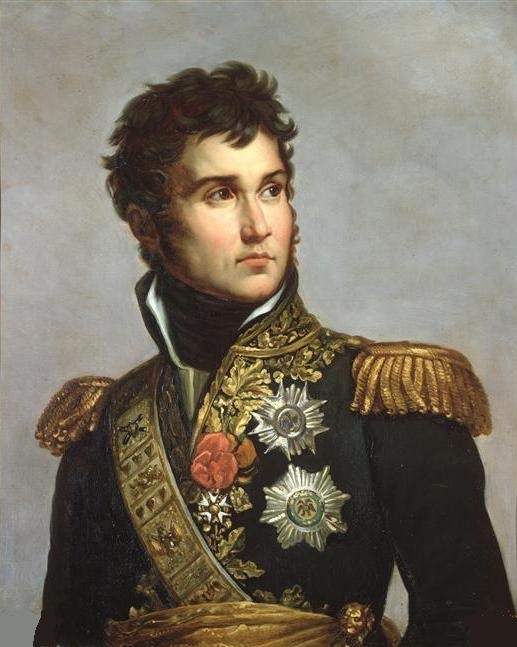
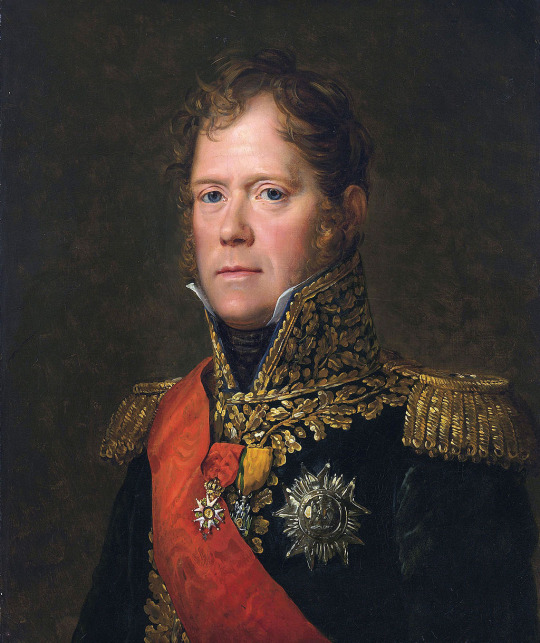
As usual, for those who don’t know much history, I shall briefly introduce my babeys these two great soldiers.
Jean Lannes was one of the marshals of Napoleon, known for being one of Napoleon’s closest friends and his fiery personality, and is considered one of the best marshals of the 1st French Empire. His finest moments including the Battle of Ratisbon in which he led his men to storm the well-guarded city with ladders (hence his nickname “ladder lord” in our very humble Napoleonic marshalate fandom :3). Sadly, he died of the wound he received in the battle of Aspern-Essling in 1809.
Michel Ney was also one of the marshals of Napoleon, known for his extreme valour (yep, he is known as the “Bravest of the Brave”). As you might know, he was one of the marshals who was in Waterloo, yet, his finest hour was during the retreat from Russia in the disasterous 1812. Sadly, he was arguably the most prominent victim of the White Terror under the second Bourbon restoration, executed in 1815 (**I am not accepting any kind of conspiracy theories of my babey survived and died in America😤).
Speaking of Ares, I have a lot of things to say (that’s my dad ;-; no jkjk). He is really not that bloodthirsty idiot who casually hates humans. Well, he’s more like a fiery dork and a man who was very faithful to his lovers, and fights very well (by the way also one of the best dads). So, the bois that come into my mind are automatically two of the most courageous marshals of France.
Lannes, if I have to get him a godly parent, it would definitely Ares. He resembled the god a lot (also I sometimes imagined Ares as a smol bean with dark hair), probably looks the most like Ares himself. He got that fiery temper, that faithfulness to his wife Louise, also being a very courageous fighter in the field—well he literally was like, “NO LEMME STORM DAT CITY *grabs ladder*”.

There you have it, my big bro our ladder lord Jean Lannes who can pull off a perfect Ares.
Ney is like a slightly introverted (and mature) version of an Ares person. You can guess his temper already through his famed auburn hair, and indeed despite his shy exterior his temper sometimes was a bit explosive, and a bit impatient (which was somehow one of his fatal flaws). He was a great fighter, known as a skilled swordsman in his youth. And you all know how brave he is in his famed epithet. Michel Ney is purely badass (and C U T E) you know (and he needs a lot of hugs because he has really been though a lot in the wars, and was a possible case of PTSD which was shown in his arguably suicidal behaviour during the battle of Waterloo). That’s why I casted him as the Greek god Ares OwO
//
And there you have it, my interpretations on the Greek gods via people in history. I originally would like to include more but somehow I realised that I have written too much about my picks. So, if you want to add more, reblog this post or tag me on the post you made on this topic (and please use the hashtag “mythical figures as historical people” so that I could look into your choices via the search bubble on this app🥺).
Last but not the least, I hope you all lovelies like this, also have learnt something new via my brief introductions on some historical people. Have a great day!
#greek mythology#finally some Greek mythology content#i hope you all don’t mind me overselling my bois#no shipping intended on the castings#this is from an ex-Hellenic devotee who had been in Classics class#Zeus#Hera#Aphrodite#Apollo#Ares#methods of procrastinating from university tasks and responsibilities#why am I still up in 2am I said I would get a proper sleep tonight for excessive headbanging to David Bowie for his birthday🌚#the relationship between Franz and Sisi got me sobbing all the time#Louis XIV#Catherine of Aragon#pauline bonaparte#joachim murat#franz joseph i#elisabeth of austria#elisabeth of bavaria#empress sisi#jean lannes#michel ney#mythical figures as historical people
93 notes
·
View notes
Text
Joseph Brodsky: to translate is to exist
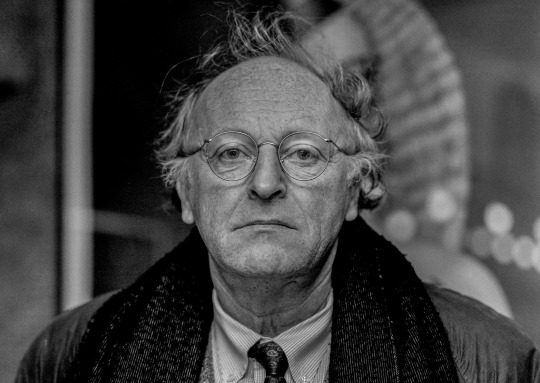
The poet lives in his poems and only through these he can assert his own existence; the poet can be oppressed, censored, encaged, also killed, but until he can write, until there’s someone who reads his poem, he will go on living, he will be free despite all. Deported poets, exiled poets, poets oppressed by a dominant and colonial culture, but still poets, although they have lost their language. And as it’s possible to lose a language, it’s possible to find a new one to tell about the self in verses; this was well-known to Joseph Brodsky, a Russian poet and author, moved to the USA because he was condemned for parasitism and for a cultural environment more and more saturated with hostility and suspicion which censored and hinder the publication of his poems, shut his poetical voice through editorial obstructionism, denied his existence as an author, and thus also as human.
Brodsky’s verses didn’t officially exist in the Soviet Union (but read clandestinely and published via samizdat), so he didn’t exist himself as poet, as man and to exist, he had to make the hardest of the choice: leaving his home country, his native language, denying it because this language refused his creative soul. He left Russia after he was compelled by the regime, he moved abroad and reaching the USA, a Country completely different from the Soviet Union, too much free, too much noisy, but perfect for Brodsky’s poetry. There he translated his rhymes in English and his works were officially published, there Brodsky exists, there his art is loved. There’s no way to oppress the voice of a poet, because it will always find a way to speak, as well as self-translation, instruments of poetic (and cultural) resistance, as well as changing the language, the Country, traditions. Also forgoing himself.
Self-Translation is when author and translator are the same person, when an author translate his/her own literary work. As it happens in translation, there’s an original and a translation, or there’s no translation (when the author chooses to write in a language different from his/ native ones, a behaviour that in very common among colonial and post-colonial writers). The Self-Translator is a bilingual and, often, bicultural (because he/she is an immigrant or a child of immigrants, lives between frontiers or in a former colonised country). On the contrary to a translator, the author who chooses to translate him/herself has access to the original intention (i.e. now and why the author chooses to write a certain expression and the original meaning), original cultural context or literary intertext. This possibility has, however, some limits: the famous psychoanalyst Carl Jung explained that neither the author is completely omniscient (aware of what he wrote in the past) and «[…] have to read it again and may not even completely understand their own motivation for choosing certain passages, certain examples or a certain style»[1]. The most famous authors who translated their own works were Samuel Beckett (from English to French and German, and vice versa) and Vladimir Nabokov (from Russia to French, and vice versa).
What are the types of Self-Translation?
Michaël Oustinof identified three types of Self-Translation: 1. Naturalising Translation (naturalisante): when an author gives priority to the characteristics of the target language (that is that language a text will be translates into). 2. Decentralised Translation (décentrée): when an author introduces in the target language foreign elements that belong to the source language (that’s the language a text is written in). 3. (Re)Creating Translation((re)créatrice): when an author translate and change his/her literary work (or omit some parts) in order to adapt the text to both the target language and culture.
Who are the authors that translate themselves? 1. Bilingual (or polyglot) authors who wants to expanse their audience or just experimenting. Usually, there’s a relation of symmetry between the source and the target language (e.g. French and English). It’s the case of Samuel Beckett. 2. People who speak minority language but choose to write with a dominant language. It’s the case of Luigi Pirandello who translated his plays in Italian from Sicilian dialects. 3. Colonial or post-colonial author who write both in their native language and colonial language. 4. Exiled or emigrant authors who write in the language of the Country they moved to. It’s the case of the Russian Vladimir Nabokov who, after moving to France, started writing books in French (such as his famous novel “Lolita”) and the same Joseph Brodsky.
The case of Brodsky and other Russian emigrée is a unique case of self-translation. Usually, who translate theirselves are those authors living in a condition of colonialism, i.e. they’re from a colonised from another of more prestige and political and cultural power, consequently their native languages becomes hegemonic to the language spoken by the colonists; the authors who live this kind of experience chose to translate their literary pieces to the dominant language, that is the colonist one, so that their work can emerge from a state of oppression, then reaching a larger number of readers and settling their existence as a creative and make raise their culture from the barriers of the dominant one and speak to the colonists through that; so, we’re talking about a form of cultural resistance.
Emigrant Russian authors didn’t choose to translate their world into the language of the Country which welcomed them, because their native culture weren’t oppressed, but because they were oppressed by their own culture; their works were usually divergent from the aesthetic ideals of the regime, thus they were censored or the official publishing was denied (and, often, neither by Russian magazines abroad); to survive as writers and giving life to their literary pieces, most of these authors chose to translate themselves. This kind of self-translation is, in this case, symmetrical, according to Rainier Grutman, because Russian and Western languages have got the same literary prestige, and the bilinguism here is exogenous (always according to Grutman’s definition) because these languages (especially about the relation between Russians and English) have never shared the same geographical spaces.
What pushed Joseph Brodsky to leave his home country and starting a new life and a new poetic and translating in the USA was the accuse and the arrest for parasitism, happened in 1964 (for which Brodsky was interned in the psychiatric hospital of Moscow and after deported and condemned to the forced labour near Arkhangelsk, on the extreme North of Russia). Thanks to his fame, he was freed in the November 1965 after a petition signed by Russian and foreigner colleagues but for the Party Brodsky was a hostile figure to the regime; in fact, when we requested a permission to go abroad, after he was invited by Robert Lowell to attend the International Festival of Poetry in London, «the Union of Soviet Writers answered there were no poet with that name in Russia: he was crossed out from the official list of Russian writers»[2]; they denied him the right of writing, the natural right to proclaimed himself poet and for a real poet this means denying his life, denying his dignity. Refusing his poetry is to refuse him and thus happened when, in 1972, he was commanded to leave the Soviet Union; that means he was not welcomed by his move country, his Russia, his Russian any longer. So, what can a poet do? Brodsky remembers: «on 10th May 1972 I was called out and they told me:”Take advantage of one of the invitation people make to you to leave for Israel. We prepare a visa for you in two days”. “But I don’t want to take advantage of”. “So, prepare for the worst”. I couldn’t do anything but to give up: I managed to make the gems prolonged to 10th June (“after this date, you’re going to have no identity card, absolutely nothing”): I wanted to pass until my 33rd birthdays with my parent in Leningrad, the last one. When they gave me the expat visa, they make me jump the line: there were many Jews waiting days and night for the visa who looked at me astonished, envying me […]. I past the last night in the USSR writing a letter to Brezhnev. The following day I was in Vienna»[3]. He was in Vienna when he met the English poet Brodsky loved most, Wystan Auden, with whom he attended the International Festival of Poetry in London, event that allowed him to meet other authors from the literary Anglo-Saxon world, such as Robert Lowell, but he already left Vienna to move to the US in the July of the same year: he was offered to work to the University of Michigan (where he taught until to 1980). Thus began one of the most important phase of Brodsky’s work and his path to self-translation, which allowed him to reborn as a man and a poet. He lost his language, his Country, but he found a new language through which thinking, loving, writing, through which expressing himself, through which existing. To write is to exist.
Translating ourselves to exist, translating as that our own work to overcome national and cultural borders, to destroy linguistic barriers, to annihilate the borders. «Civilization is the sum of total of different cultures animated by a common spiritual numerator and its main vehicle – speaking both metaphorically and literally – is translation. The wandering of a Greek portico into the latitude of tundra is translation»[4]. Translation is what allows us to converse with other cultures, with the Other, and the translator is, thus, a cultural mediator that lays between two interlocutors and help them to understand each other, not only linguistically, but also culturally, that let bonds between values, norms and beliefs be understandable to who doesn’t know them. Brodsky gave new life to his poems, already oppressed by the hostility of Soviet regime, and he gave the, new social coordinates, although he destroyed the grammar, i.e. the foundation of English language in order to adapt this language to the linguistic malleability of Russian, in order to everything, the intrinsic structure and so the semantic built by that could persist. «Brodsky […] insisted strongly on a mimetic translation i.e. a translation which would retain a poem’s verse structure – especially its rhymes, verse metre, rhyme patterns and stanzaic design should be preserved above all»[5].
A mimetic translation, them, which doesn’t break the architecture of poetry and it fits, as well, the presence of Russian soul in the English language and so the in grammar and morphosyntax, that comes from Pushkinian tradition, according to the form and the content corresponding and so, none of them should be sacrificed in the translation. A tradition enhanced by the Acmeists (such as Anna Akhmatova and Osip Mandelshtam), from whom Brodsky took inspiration. According to the Acmeists, in translation, must be preserved the number of lines, verse metre, rhyme patterns, types of enjambements, rhyme types, linguistic register, types of metaphor, special devices and changes of tone. Following this tradition Brodsky translated his poems from Russian into English, though transforming and upsetting the target language, though drowning bitter criticisms for that which will be have called “Englishness”. Upsetting the language in order to appear himself as a poet, as a Russia. His soul must have to emerge, if he wanted to live through poetry, and the only way to do it, in this case, is to annihilate the rule of the other language, a language chosen to survive. This foreigner who transformed a language that is not his to make it an instruments of resistance, an instruments of existence. The harshest criticism towards his English was from the British School, which blames Brodsky of transforming the language to make it adapt to his needs; a criticism that hide the will to protect the integrity of the language from an “intruder” like the Russian Brodsky. Despite all, the poet received much esteem, especially from the American School which appreciated his experimenting with the language. Experimentalism due to the dissatisfaction of English translation to Russian poems that Brodsky criticized because they were not capable to keep the complex morphosyntactic structure of the poetic of Russian language. He wrote about it: «Translation from Russian into English is one of the most horrendous mindbenders. There aren’t all that many minds equal to this. Even a good, talented, brilliant poet who intuitively understands the task is incapable of restoring a Russian poem in English. The English language simply doesn’t have those moves. The translator is tied grammatically, structurally»[6]. Even though his approach which was very little conform to modern translation theories, even though we can blame him to have turned upside-down the English and so we can speak of Englishness in his poems, Brodsky «[…] approached his translation with a fervour verging on the quixotic, squaring the circle of poetic translation, defying the spell of impossibility and bridging single-handedly the linguistic gap with great energy» [7].
Viviana Rizzo
Notes
1. AA.VV., Handbook of Translation Studies, edited by Yves Gambier e Luc van Doorslaer Amsterdam, John Benjamins Publishing Company, 2010, p. 306
2. «L'Unione degli Scrittori Sovietici rispose che non c'era nessun poeta con quel nome in Russia: era stato depennato dalla lista ufficiale degli scrittori russi», in CONDELLO, Anna, “Iosif Brodskij: una biografia intellettuale”, in Russian Echo, web (http://www.russianecho.net/contributi/speciali/brodskij/bio.html retrieved in 28th May 2021)
3. «Il 10 maggio 1972 mi chiamano e mi dicono: "Approfitti subito di uno dei tanti inviti che le vengono per emigrare in Israele e parta. Le prepariamo il visto in due giorni". "Ma non ho nessuna intenzione di approfittarne". "E allora si prepari al peggio". Non potevo far altro che cedere: sono riuscito al massimo a farmi prolungare i termini fino al 10 giugno ("dopo questa data non ha più carta d’identità , non ha più niente"): volevo almeno passare a Leningrado il mio trentaduesimo compleanno, con i miei genitori, l'ultimo. Quando mi hanno consegnato il visto d'espatrio, mi hanno fatto saltare la fila: c'erano tanti ebrei che aspettavano, che bivaccavano là in anticamera giorni e giorni in attesa del visto e che mi guardavano esterrefatti, con invidia [...]. L'ultima notte in Urss l'ho passata scrivendo una lettera a Breznev. Il giorno dopo ero a Vienna», in CONDELLO, Anna, “Iosif Brodskij: una biografia intellettuale”, in Russian Echo, web (http://www.russianecho.net/contributi/speciali/brodskij/bio.html retrieved in 28th May 2021)
4. BRODSKIJ, Iosif, “The Child of Civilization”, Less than one, London, Penguin, 1986, p. 139, cit. in ISHOV, Zakhar, “Posthorse of Civilisation”: Joseph Brodsky translating Joseph Brodsky. Towards a New Theory of Russian-English Poetry Translation, Berlin, Freien Universität Berlin, 2008, p. 2
5. ISHOV, Zakhar, “Posthorse of Civilisation”: Joseph Brodsky translating Joseph Brodsky. Towards a New Theory of Russian-English Poetry Translation, p. 4
6. SOLKOV, Solomon, Conversations with Joseph Brodsky, New York, The Free Press, 1998, p. 86, cit. in ISHOV, Zakhar, “Posthorse of Civilisation”: Joseph Brodsky translating Joseph Brodsky. Towards a New Theory of Russian-English Poetry Translation, p. 5
7. ISHOV, Zakhar, “Posthorse of Civilisation”: Joseph Brodsky translating Joseph Brodsky. Towards a New Theory of Russian-English Poetry Translation, p. 3
Sources
1. COCCO, Simona, “Lost in (Self-)Translation? Riflessioni sull’autotraduzione”, in AA.VV. , Lost in Translation. Testi e culture allo specchio, vol. 6 (2009), pp. 103-112
2. GRUTMAN, Rainier, “Beckett and Beyond. Putting Self-Translation in Perspective”, in Orbus Litterarum, n. 68, vol. 3 (2013), pp. 188-2016
3. GRUTMAN Rainier, VAN BOLDEREN Trish, “Self-Translation”, in A Companion to Translation Studies, edited by Sandra Bermann and Catherine Porter, New Jersey, John Wiley & Sons, Ltd., 2014, pp. 323-332
4. ISHOV, Zakhar, “Post-horse of Civilisation”: Joseph Brodsky translating Joseph Brodsky. Towards a Mew Theory of Russian-English Poetry Translation, Berlin, Freien Universität Berlin, 2008
5. MONTINI, Chiara, “Self-Translation”, in Handbook of Translation Studies, edited by Yves Gambier and Luc van Doorslaer, Amsterdam/Philadelphia, John Benjamins Publishing Company, 2010, pp. 307-308
6. WARNER, Adrian, “The poetics of displacement: Self-Translation among contemporary Russian-American poets”, in Translation Studies, vol. 11. N. 2, 2018, pp. 122-138
#Joseph Brodsky#self-translation#translation#Russian Literature#Cintemporary Russian Literature#literature as resistance#translation studies#literature#USA#USSR#Soviet Union#Russia#politics#culture#regime#dictatorship#migration#writing#blogging
21 notes
·
View notes
Text
Looks like it's September again (already, somehow), so that means that it's Nintember again, which means I'll be writing again! Same dealio as last time, one story per five prompts, up to six writings total. (And I'll be putting most of each under a cut, because mobile users can't skip posts)
And for my first entry for @starprincesshlc and @jklantern 's wonderful little event, I shall once again be attempting to twist some modicum of continuity, characterization, and canon-compliance out of a world that clearly cares scarcely for all three.
The Great Act
~~ Art, Green, Dizzy, Fire, Strength ~~
It was the loud buzzing of his phone’s alarm clock that dragged him from his slumber. He awoke to find himself sprawled across the couch, which was in no way long enough for his lanky body and spindly legs. As he blearily reached out and slapped at the coffee table, hoping to find the rude device by pure luck, he also blearily reached out and slapped at his memories, trying to figure out what series of events had led him there. For a moment, they floated just out of reach, and then suddenly flooded back to him all at once.
Oh. Right. It’s all over.
Another sporting event had come and gone, and as usual, in spite of all the effort he put into training and practice, he had ultimately lost to the same people he always did. No matter the sport, no matter the plan, no matter the time, they always won. And why shouldn’t they? The heroes always win in the end, always securing victory against the villains.
And he was one of them: the purple-clad counterpart, mirror, and supposed rival to one of the land’s most revered figures. Meant to oppose, and meant to lose.
He was Waluigi.
The name still sounded absurd to him. He had no idea how two men whose names were ‘Mario’ and ‘Wario’ and who naturally served as near-perfect foils of each other, had managed to meet and form such a publicizable rivalry without any deliberate effort, but such was the case. However, the notion that the brother of one had his own doppelganger in the brother of the other (or cousin, they never did manage to keep that story straight), with the same dichotomies of name, body, and personality? That was simply and utterly ridiculous, far beyond even the realm of ‘too good to be true’. And yet, if anyone had caught on, they hadn’t made it known to him.
Lost in thought and routine, he realized he had reached and opened his wardrobe, where numerous sets of that purple hat, shirt, and overalls were staring him in the face. In a sickening sense, they were the centerpiece of a great work of art, the fabrication that was his entire public existence, the character that he and Wario had constructed so that he might further be the ‘evil counterpart’ to everyone’s favorite red-clothed fire-throwing hero. Mario was stout and a bit fat, Wario was stouter and fatter; Luigi was tall and a bit thin, so Waluigi was taller and thinner. Mario had an M as his emblem, Wario had an inverted M; Luigi had an L, so Waluigi had an inverted L. To any casual outside observer, it was perfect.
But unlike Mario and Wario, whose rivalry had been formed in their youth, Waluigi had never even met Luigi until Wario had made him his sporting partner. The most he had known of the legendary Mario Brothers was just that: they were legends, for the countless adventures and quests they went on. In truth, despite how much he played it up during each and every game, he bore no true grudge against the man he was supposed to hate; Wario had, for a time, convinced him that Luigi’s presence in the public eye was somehow detracting from his own, but he had long since realized that that wasn’t the case; in fact, it often seemed like Luigi himself was being snubbed by the public, with the vast majority of the glory placed upon Mario, no matter how much Luigi contributed.
And yet, despite his existence being little more than a convenient story, despite the stress that constantly acting like a jerk brought, and despite always losing at the games no matter what, none of it brought him any sadness: for all its ups and downs, he felt himself to be rather good at keeping up the act, and the sports were, at the end of the day, still fun.
So why do I still feel so… bad?
Routine and thought had once more brought Waluigi elsewhere, and he found himself once more on his couch, now dressed in his usual outfit, with some sort of drink in his hands, probably coffee or tea; he didn’t care to determine which at that moment. His eyes casually wandered around the room as he brought the mug to his lips.
Then, just as the liquid touched his tongue--apparently he had managed to make tea out of coffee beans--the answer came to him. All across the room’s walls and shelves was sporting equipment of every sort--tennis racquets, shin-guards, helmets, golf clubs, old kart wheels, giant dice blocks, a probably excessive number of deflated balls--and absolutely no other sort of decoration. He leaned forward to place the mug on the table, and in doing so noticed his gloved hands and violet sleeves. Who wore the outfit of a character that they supposedly were not, every single day? Apparently, him.
He didn’t do anything else. He had let the character that was Waluigi consume his life to the point that had no idea who he was outside of it. He had nothing that he did when sports weren’t involved. Wario didn’t dedicate all his time to his rivalry; he owned an entire video game company--an unstable and poorly-run one, certainly, but it was nevertheless another use of his time. Mario and Luigi had their own grand adventures, of course, which is also what Peach, the Yoshis, Bowser, and his horde of minions were all typically involved in.
They all had lives outside of the games, and what did he do during the interim times? He either tried to practice, on his own, in the few suitable locations that he could find when the world was arranged for adventure, in a vain attempt to not lose as bad when the next game came around, or he wallowed in his home, doing absolutely nothing of any import.
But what could he do? Waluigi was never anything beyond a fabricated counterpart to both Wario and Luigi, but he could not remember, even slightly, what or who he was before he embraced that role. That nearly all of his memories prior to his first meeting with his partner were lost to him, was, he shuddered to admit, rather unsettling. Not even his old name--if he even had had one, he could not recall anymore--would reveal itself to him, and it was not as though he could simply find out through some external means: he was never the best at record-keeping, and to really sell their act, he had had his name legally changed to “Waluigi” and all references to his previous identity erased.
He shook his head, attempting to clear his mind of thoughts. There was little sense in worrying and fretting over who he was in that moment--the chance of any sort of useful epiphany emerging from it was even slimmer than he was.
Ugh… better just try to distract myself…
The first suitable option to catch his eye was the TV remote lying on the table. He quickly grabbed it and flicked on the set, and was immediately assaulted by the cheery enunciation of the Lakitu news anchors on the aptly-named Lakitu News Channel. He recalled that that was the channel he had left the set on last night, after he had gotten quite fed up with the incessant and inane blathering about the events of that day’s final matches, and it took only about five seconds to figure out that they were still on that topic. Scowling, he began flipping through the various channels available, hoping to find something interesting enough to block out the melancholic thoughts that were biting at his mind, like a hundred tiny Muncher and Nipper Plants.
After a painfully long series of more newsrooms--all talking about the exact same thing, of course--and unappealing shows--Half of these are for children and other half would just make me feel even worse!--he stumbled across some sort of advice segment hosted by a Birdo (was it the Birdo? He couldn’t tell). With absolutely no better options, he resigned himself to sit back and listen halfheartedly to whatever trite tips she tried to provide; maybe they’d be amusing enough to at least give him a small chuckle.
“I hope you all enjoyed our lovely guest! Now, before we move on to the submissions from all you wonderful viewers, I’d like to reiterate some old, but tried and true, advice, which I hold very close to my heart.”
Oh, here we go…
“Something which you probably hear very often is to always be yourself, or to always be true to yourself…”
Feh, I can think of several people who definitely shouldn’t do that…
“But it may be that you don’t like who ‘yourself’ is, or perhaps you don’t know what self you even have to be true to…”
Hah! As if… uh…
“And to that end, I’d like to say that there is always room for change. There’s always a way to make something new of yourself, to alter the parts of you that you want to, to become a different, better person. ‘Yourself’ can be whoever you want it to be; never are you locked along one unending bleak path. Try new things! Experiment! Don’t let yourself be trapped in an endless cycle.
“Believe me when I say I have personal experience with this: I’ve done so many different things over a rather short period of time, trying to find what I wanted to do with myself, who I wanted to be. Even now, I’m still not entirely sure if this is my supposed ‘calling’…! But I never got anywhere by doing nothing: it was on me to break out of my shell and search for myself, and now it’s on you to do the same.
“You don’t have to begin drastically, with a flying leap of faith--I think we’ve all walked over enough cliffs by now to know that!--but, if this is the sort of mindset you find yourself in, why not try taking some small steps today? It could be as simple as wearing a new outfit, or talking to someone new, or partaking in a new pastime.”
Birdo continued to elaborate on her point, but Waluigi--or, whoever he was beneath that--had stopped listening. He wanted to make some snark about what she said; he wanted to rationalize how what she described couldn’t ever apply to him; but, he found that he couldn’t. He had attempted to follow similar advice long in the past, and failed, but something about the way she phrased it, managed to affect him more deeply than he had thought possible. It was as though her words had dug beneath his shields and layers and pierced something somewhere in his core; pulled a lever, turned a handle, flipped a switch.
A strange sensation washed over him, one he could only describe as a blazing fire--nay, an inferno--igniting within him. He had felt the touch of flame countless times over the years, but not even the innumerable rage-fueled volleys he had endured, all combined into a single force, could compare to what now burned in his soul.
He leapt up from the sofa and ran to his bathroom. Staring at him from within the mirror was a character, a costume, a facade. It was not who he was. He grabbed a towel, dampened it, and proceeded to scrub away the pink paint on his nose; Wario and Waluigi’s noses were defined by that bright rosy color, but his was not. He then tore open a cabinet and grabbed his bottle of mustache product; normally, it was used to create the signature angular mustache of Waluigi, but today, it would shape the hairs into something softer and curlier. Whether that was what he would ultimately like did not matter: he was experimenting! He was changing himself!
Though the man that stared back at him from the glass now bore a much different visage, it was still framed by the purple cap and shirt, yellow emblem, and dark indigo overalls. He tore them off, then opened his wardrobe once more and threw all the copies of that same outfit to the ground. Hidden behind them were old clothes that he hadn’t worn for many, many years. He grabbed the first garments he saw--a casual dress shirt and gaudy neon-yellow shorts. Did those go well together? It didn’t matter. Without hesitating, he put them on.
He quickly glanced in the mirror again: the ensemble was nearly complete, but just missing one last touch. He thought on it for a moment, then stricken with brilliance, hurried to his modest backyard, where the roses he performed with in the games grew. He plucked one from its bush and affixed it to his hair, then ran back to the mirror to observe himself one more time.
His mismatched get-up would likely garner many stares from others, though he wouldn’t mind them at all; if he had anything in common with Waluigi, it was that they both loved being the center of attention. Even still, that’s not what mattered. A whole new day lay before him, a whole new day to be someone new, someone different; to move on from the cycle he had been stuck in, to take a whole new step forward.
He returned to the sitting room and turned off the television, then went to the front door. Taking a deep breath, he turned the handle, threw it open, and marched into the daylight, the daylight which felt far fresher and warmer than it had in a long time, though even it held no candle to the flame that continued to blaze within him.
Ready or not, world; here I come!!
#nintember#my writing#godss there were so many directions i thought about taking this#eventually had to just choose and commit to one#straight up wrote a great deal of a different take before scrapping it#writing is... a time
6 notes
·
View notes
Text
stream of consciousness rant under the cut about teddy
teddy altman is the funniest character in the world because he’s LITERALLY /in/ the civil war event in a single panel with billy where they’re both like THIS IS FUCKED UP BRO! I DONT WANNA BE HERE!!!! and then he’s in the skrull invasion event where he could LITERALLY STOP THE SKRULL INVASION at ANY TIME and he’s just like ‘haha... i’m 16 bro and i kinda... don’t want to kinda busy being gay rn : / its a big time investment’ and thats also incredibly funny
but whats MOST funny is that all this happens to him, he’s literally an avenger, he has this whole thing with ‘mother’ in ya v2, he’s hot af 21 year old with his whole life in front of him but because he’s not related to any OTHER avengers except for the old captain marvel who is dead as a doornail and who he has a complicated relationship with, he’s like : (((( i have no purpose.... i’m sad... i’m gonna eat pizza bc my boyfriend is cooler than me he has two families : (((( and he’s friends with doctor strange... i’m not friends with doctor strange...
like obviously he just has depression and self-worth issues and such a strong sense of unreality that he briefly believed he was not a real person and was made up by his boyfriend?
but also.
like TEDDY ALTMAN. you FOOL. ur literally a SPACE PRINCE. ur COOL as fuck. stop playing animal crossing and luigis mansion. you can FLY. and SHAPESHIFT. idiot
how are you going to be living the transgay DREAM life and be like : (((( like teddy fucking altman. you wish fulfilment based fool
he’s like the most painfully normal gay guy in the universe like he might be a shapeshifter that has the abilitiy to turn himself into a hunk, but under that. he’s round spongebob with depression. his favorite game of thrones character was tyrion, which means he definitely didn’t read the books, AND he legitimately liked the show and the character of tyrion within it. i will never forgive him for that
i’m giving him a lot of shit here but thats because i’m an asshole. i love him to death. but it’s like ‘teddy u big boob with big boobs. sort ur shit out.’ and he does end up sorting his shit out. but jesus. how are you so normal
i think my problem with teddy & billy in general is they don’t feel REAL to me in a lot of ways bc a lot of their characterization is so by-the-numbers ‘gay’ but also ‘rich’ and ‘popular’ and ‘depressed’ so i like. this is NOT my gay experience. i’m a fat non-binary butch dyke agoraphobe. i can’t comprehend their story because it’s so fundamentally different to my own lived experience. and when i try to make it match up to mine---it feels like billy & teddy are living in a dream world where they have absolutely no flaws bc they’re forced into being ‘charming gay representation for teens to look up to’ and its like. what am i supposed to do with this. with the exception of the gillen run. which everyone??? hates now????? i don’t know. i love them. and more importantly i’m still trying to understand them on my own terms, how they’re written---what they really represent beyond being the most popular two charcters on r/lgbtsuperheroes, beyond winning glaad awards.
like who ARE they beyond billy and teddy. who are they beyond the labels and whats the latest in nerd culture and gay culture pop culture references!!!!
what makes a ‘canon gay character’ ‘canon gay’ and what makes them textured, layered, real? the second one is so much important to me, but how can i distill ‘realness’ and give it to those canon gay characters? how can i make one half of a pair which is about one third of a set make SENSE to me. feel like the gay people i know, feel like members of my community i can relate to and respect without feeling a sense of jealousy, a sense of self-hatred, a sense of being robbed of a universal experience of ‘canon gayness’ that doesn’t and will never exist?
this just has to be my next project tbh. getting back into young avengers, figuring this out.
how do ‘out gay people’ live, how do the ‘popular kids’ live, beyond maligned celebrities and royal families that i understand in their fucked up straightness---how does it feel to be accepted & acceptable and still gay AND MENTALLY ILL?
i don’t know, man! i don’t know! i think maybe i just can’t see the forest for the trees. but billy & teddy feel like too much to hope for in this world sometimes, too soft a story, too kind but also? too... fake? i got issues yall
3 notes
·
View notes
Text
Possessed Chapter Three: Mario
Without the adrenaline coursing through him, the pain in Luigi’s arm was so much worse. It throbbed in time with the rather horrid headache that was rapidly setting in. He wanted nothing more than to lie down in a dark room and curl around his arm in wretched misery. But despite how bad it was, King Boo’s only complaint was that the blood leaking from it and soaking into his sleeve and getting all over his front too ruined the look he’d been going for.
‘It’s not my meat suit,’ he explained. ‘So I have no reason to care if it gets damaged.’
Well Luigi cared and he would very much prefer it not be. He had no say in that though. King Boo didn’t even seem inclined to bandage his arm because he was just like that.
Instead he focused on E. Gadd and ensuring he did as he was told and freed all the boos in the three vaults he’d kept them in. As soon as they were all released back into the wild, Luigi got an uncomfortably strong sense of King Boo’s happiness about it and this situation as a whole. He was almost tempted to cling to it to escape his escape his misery more but didn’t; he didn’t want to share in King Boo’s joy about any of this.
Next came the destruction of the equipment that had captured and held the boos, including the Poltergust E. Gadd had been seemingly been in the process of repairing before he tried to use it defend himself with it. King Boo stepped in to do that himself, using a mix of magic and Luigi’s fists and feet and eventually even a crow bar.
He was ruthless, zapping, punching, kicking, smashing, until E. Gadd’s machines were reduced to a pile of metal and wires. It made the pains Luigi was already experiencing worse and introduce new ones. And King Boo didn’t stop at the vaults and Poltergusts either, he started going to town on everything else in the lab too, his rage fueled by a personal vendetta.
E. Gadd tried to protest a few times but King Boo wasn’t listening, he gave up when King Boo threatened to kill him if he didn’t shut up. Polterpup stayed by him, always placing himself between him and King Boo growling ferociously whenever the latter moved too close. Overall, it was bad, stressful time for everyone except for King Boo.
“There, you’re done” E. Gadd said what felt like forever later when King Boo’s anger seemed to finally be spent and everything in the lab had been reduce to little more than piles of rubble. “Now release him.”
Panting a little from exertion, King Boo turned to face him with a grin, resting the crowbar against Luigi’s shoulder. “When did I say I was going to do that? I don’t think I even implied it as a possibility.”
E. Gadd gasped and glared. “But… you can’t… You got what you…”
“He’s my puppet, I’m not giving him up.” Lifting his chin, King Boo tossed the crow bar to the side and started for the exit. “Lucky for you though, I’ve decided to let you live. Leaving you alive after wrecking your lab, destroying your life’s work, unable to take revenge against me without hurting your friend even more than he’s already hurting is better vengeance anyway.” ‘If he attacks, I’ll change my mind though, I don’t like disrespect.’
Thankfully, E. Gadd just muttered a few more attempts at a protest that King Boo ignored completely. He followed King Boo out and to the car, only giving up when King Boo slammed the car door shut.
‘Let’s go pay Mario a visit now, huh?’ King Boo said as he backed out of the driveway, running over E. Gadd’s mailbox in the process.
Just when things seemed they couldn’t get any worse too. … Please don’t. But… no amount of begging would convince King Boo to change his mind. He only took pleasure in it and thus… Luigi didn’t even try very hard. … King Boo laughed out loud about that.
-
By the time they reached Peach’s Castle, Luigi was tired enough that he probably would’ve been able to fall right asleep even with the pain in his arm. The bright sunlight as King Boo walked his body through the courtyard hurt his eyes and made him feel unwell – part of that might be blood loss though. Though it was nothing compared to the dread growing in him at the thought of Mario seeing him like this; a pitiful sorry state, actively violated by King Boo.
What was Mario going to do or think or say? Would he believe that this was Luigi’s fault somehow? How disgusted would he be? Would he even…
“Luigi?” It was a toad, he approached King Boo and Luigi hadn’t even noticed.
“I’m looking for Mario,” King Boo said, attempting to speak like Luigi.
“What’s up with the uh…” Toad trailed off, gesturing vaguely at his face. “And why are you dressed like that? And what happened to your arm? That’s not… blood is it? I don’t like blood.”
King Boo held back a sigh of annoyance. “I-I need to talk to Mario. It’s important. Do you know where he is?” His imitation wasn’t the worst in the world but with everything else it shouldn’t be at all convincing. … Unfortunately, the castle toads had never paid much attention to Luigi so this one looking like he believed it was not much of a surprise.
“Uh… uh… I’m not sure. Probably in the castle somewhere, maybe his room. You uh… should probably get that looked at if it is blood… it doesn’t look good.” At least it wasn’t actively bleeding anymore though, right?
“Yeah, sure, I’ll do that.” King Boo turned away to start for the castle again. ‘Toads are annoying, how do you put up with them?’
Luigi should respond in defense of the toads but considering how that one had just mostly ignored the fact that something was very blatantly wrong here he wasn’t even really sure he wanted to. And he lacked the energy to really try anyway.
As always, the door to the castle was unlocked. The toads guarding it reacted to Luigi’s current appearance much the same way the first one had, letting King Boo enter with little questioning. Ugh! How did they not see the crown and think ‘King Boo’? They’d never been the smartest folk around but surely they couldn’t be that stupid? … Then again though, other than the toads who’d come to the hotel with Peach, none of the castle toads had ever seen King Boo so maybe they just didn’t know.
‘Or maybe they just hate you. It wouldn’t surprise me.’ King Boo smirked as he strode freely into the castle.
Maybe you should just shut up.
King Boo laughed internally. ‘Oh, getting angry now, huh? Sure did take a while.’
Luigi refused to respond. Everything he did or said only ever seemed to give King Boo cause to taunt him some more. So… he was just going to stop thinking for a while instead. … Too bad that was really hard to do.
The entrance hall seemed to be empty. So were many of the rooms and halls except for the occasional toad. Most were too busy to pay King Boo much mind but the ones that did, all believed his only half decent Luigi impersonation, expressing nothing but concern for his obviously sorry state. None of them knew where Mario was though, that was a relief.
Maybe Mario was out somewhere doing something with Peach or Yoshi or anyone else. Hopefully wherever he was, he’d stay there until something happened and King Boo was no longer a problem. … What were the chances of that happening though? … King Boo’s response to that thought was a hearty laugh.
After searching half the castle, they ended up in the entrance hall again. Before King Boo could start for the other half, the sound of the entrance door opening drew his gaze. … It was Mario!
‘Finally!’ King Boo was utterly delighted. Luigi was utterly the opposite.
Mario had spotted him too, pausing for a second before coming further in. “Luigi?” His brows were furrowed with worry as he came closer. “Toad told me you were looking for me. Are you… okay?”
No, Luigi was not okay. He’d never been less okay in his entire life. He desperately wanted to tell Mario that and... he desperately wanted Mario to save him.
King Boo laughed out loud, twisting Luigi’s face into an evil grin. “Hey Mario, it’s been a while. Though really, I don’t know how long it’s been, it’s hard to keep track of time while in captivity.”
Only a few feet away now, Mario stopped, his face hardening. “Who are you? And why do you look so much like my brother?”
“Can’t you guess based off the crown?” King Boo gestured to it. “And I look like your brother because in a way I am.”
No, you’re not!
Mario was silent for a few seconds before it seemed to click. “King Boo?”
“Yup!”
Mario rushed forward to grab Luigi by his shirt front. The look on his face said he wanted to punch King Boo and King Boo was going to let him. “What did do you do to him?”
“Nothing actually, well, other than steal his meat suit anyway.”
Mario’s grip loosened as he stepped back, a look of horror coming over his face. “Is he… if you…”
“Nah, he’s still in here.” King Boo winked as he tapped the side of his head. “Which is the whole point of this. You can’t do anything to me without hurting your bro even more than you’re going to be hurting me. It’s brilliant, isn’t it? I should’ve thought of this a long time ago instead of trusting Helen to do anything with her stupid hotel.” He did not like Helen, her obsession with him made him uncomfortable. … If only Luigi could do something with that knowledge or at least find it funny. “This is better vengeance anyway, don’t you think?”
Mario opened his mouth but failed to say anything for several seconds. “Why… just why?”
“Because I can and because I wanted to.”
Luigi willed Mario to run away now before King Boo could hurt him or worse. He’d have a better shot at fighting back than E. Gadd had but unable to fight back properly King Boo might still be able to…
Please, you’ve had your fun, please just leave now. Don’t… don’t hurt him… please. Luigi wasn’t even begging to be let go, he just didn’t want to watch and feel as his hands were used to hurt the people he loved. He wouldn’t be able to take that, it was too much.
King Boo was absolutely delighted with both the look of useless fury on Mario’s face and with Luigi’s desperate begging. He’d won, he was finally victorious over his enemies at last. No more would boos be sucked up into vacuums or bullied. He’d done what no other person had ever done before, he’d utterly defeated the Mario bros. And now he was going to have a little fun with that.
No… please don’t. Luigi pulled his mind away from King Boo’s thoughts as much as he could but they were too intense to get away from completely. Please don’t hurt him.
King Boo took a single menacing step towards Mario and… Something hit the back Luigi’s head with a loud bang, bringing an intense flash of pain followed by blessed nothing.
***
Mario gaped as Luigi’s body crumbled to the floor in a heap. He’d seen Peach sneaking up on King Boo from behind but he hadn’t expected her to whack him with a frying pan.
“That’s my bro,” he said gesturing uselessly at his poor brother who’d already clearly been through so much.
Peach nodded as she lowered the frying pan. “I know. But we needed to stop King Boo before he did something or before he left, bringing Luigi with him.” Yes, but surely there were less violent ways to do that. “So I knocked him out. Now all we have to do is take him to the doctor so she can look at his arm and uh… maybe head now too. And then we’ll lock him in a cell until we figure out how to get King Boo out of him.”
Mario could only groan. While that was a good plan and the only one they really had, it meant Luigi would most likely suffer even more. Why couldn’t there be a fix now?
“Come on,” Peach said as she put the pan away and crouched down to pull Luigi into a more upright position by his arms. “I need your help lifting him.”
Before obeying, Mario bent down to grab King Boo’s crown. It was much smaller now but still obvious. Maybe removing it would… Nope, it wouldn’t budge no matter how hard Mario pulled on it. So it did seem to be tied to his possession of Luigi’s body somehow but not in a way that made it any easier to fix.
“It’ll be okay,” Peach whispered as Mario gave up on that. “We’ll fix this, I promise.”
Feeling a bit choked up, Mario could only nod his thanks. Hopefully for Luigi’s sake, she was right.
-
While the castle doctor was patching up Luigi, Mario called E. Gadd. Surely if anyone knew how to fix this, it’d be him.
“Mario,” he almost shouted into the phone as soon as he picked it up. “Watch out for Luigi he’s…”
“Possessed by King Boo,” Mario interrupted. “You knew?” And didn’t think to call and share that news, really? It’s not like Luigi was his baby brother or anything, so why would he need to know something like that?
“Well uh… now that I think about, I should’ve called to tell you but uh… my lab’s in a bit of state.” He was too busy cleaning his lab to… “King Boo was rather thorough in destroying everything…” Oh. “… more than just the boo stuff too which wasn’t part the deal. Neither was freeing Luigi like I thought… hoped. He left me alive though so… there’s that. … I should’ve called.”
“What happened?”
“Well, Booigi came to my lab and tried to kill me. He would’ve succeeded if Polterpup hadn’t jumped him. Then he said he’d let me live, if I freed his boos and destroyed the boo vaults but he destroyed everything else too and I watched because… there was nothing I could do and I thought maybe he’d let Luigi go after he got what he wanted but he didn’t and…” He made a wordless sound of frustration accompanied by the sound of his fist banging something metal.
With a sigh, Mario informed him on what was happening over here and the general plan which relied heavily on him. Everything in his lab being destroyed didn’t bode well for their plans though but it was still all they had.
E. Gadd hemmed and hawed for a few seconds after Mario finished talking. “Well, with my lab the way it is, I can’t guarantee anything but I’ll try. It might take a while though.” That… wasn’t surprising. Hopefully Luigi could hold on for a while longer.
35 notes
·
View notes
Text
Ok then... It's gonna be really complicated, but let's go for a
🌙LM4-PROJECT🌙 CONCEPT PRESENTATION (part 1).
(Better say it now : it's gonna be a LONG post.)
Alright, so let's start with the main new character of the project ; and just because you can't really airdrop a character without any context, I'm going to try and summarize the global story of the game concept.
Sooo please meet :

Basically a doctor, vet, researcher and detective for ghosts.
A kid who, at her time of living, once managed to solve an important ghost crisis menacing the equilibrium between the living world and the Beyond Dimension (long story short she appeased and cured corrupted ghosts and helped them to destroy what corrupted them).
Her act got the attention of the forces that were in charge of this equilibrium in the first place in the Beyond Dimension, so when she passed away nevertheless due to pitiful life conditions, they offered her to become a really special type of spirit ; some sort of saviour, who reappear when ghosts meet dark times, who help them solve their problems and play ambassador with the Humans if necessary, by being reincarnated. (She was absolutely bewildered, but she rolled for it.)
So she did it, and became a really powerful-skilled ghost helper, getting reincarnated when needed, under the following system : she reappears where she can somehow get to the problem, but they don't have a body or soul ready for her, so her reincarnation quality depend on if there's people where she lands or not :
- like if there was no one around, she rolls with her original body, but has no soul so no emotions ;
- if there was one person, she possess their body and got their soul so feelings, but that process consumes (and kills) the unfortunate host in the end ;
- or (extremely rare), she collides with two persons, in which case she forms a soul out of their both, leaving them enough to survive and leaving her with a body mixing their both DNA, a bit of their personalities (and her original characteristics of course, just like a newborn actually), so she gets everything and nobody dies ; BUT that case is only possible if the persons's souls share a strong bonding link with each other, which is why she almost never got this in millenaries.
- (She also is deeply related to the Dark Moon.)
---
ANYWAY. These informations were here for a better understanding of the story, which comes now (the most summarized I could do) :
- It begins on a soirée at Peach's castle, where they celebrate Luigi's victory on the hotel's anniversary. Everyone is here, including notably Princess Daisy, E. Gadd and even all of our favourite ghosts.
- Light ambiance, congratulations, strangely evasive allusions from E.Gadd about how's King Boo doing, when suddenly, Luna is getting reincarnated. Just near Luigi and Daisy, who were ''just being dance partners''. And yeah you guys guessed : she gets the third reincarnation option, and becomes the child you saw in the picture. (She's extremely stunned herself.)
- Everyone freaks out, she very awkwardly explains them who she is and what she do (''no I'm not some random evil entity, chill out'') and then declares she's here because apparently an extremely important ghost figure has been abnormally weakened, so she had to take care of them asap.
- Everyone turns out to the usual ghost specialist, E.Gadd, out of reflex : then it appears he sneaked away during Luna's speech. She gets it first and hurry them to escort her to his lab : where they catch him while he's packing some weird equipment, and crystals of the same type of KB's crown, and also from the old mine in LM2. King Boo himself was surexposed to it, which that was what got him horribly sick. E.Gadd flees through a portal and breaks it before they could even react.
- So yeah : the main antagonist of the game is this time E. Gadd. We discover that he used Luigi so he could get his ghost research to another frightening level : like when they return to the new hotel for a first level, they realize that the walls and rooms and everything is stuffed with sensors and ghost studying material- and when they get to the roof, they have to leave in emergency because the whole building fucking teleports god knows where. Which was obviously planned for something like that.
His reasons will be discovered around the two tiers of the game.
- They also realize he greffed some ghosts with mind controllers. They are the enemies in the first two mansions, (I'd talk about that in another post), along with robots and gooey thingies. After, they (Luigi) have to ride through the Evershade Valley, to prevent anymore damage, and have to capture boss victims of ''ghosts controllers'' and free-minded but scared and recalcitrant ghosts.
(I didn't heard of the Experiment AU when I got this idea, just to clarify. Sorry.)
- Meanwhile Peach and Daisy host the now homeless ghosts (who are in-game randomly wandering in the castles, doing their shenanigans and the player can interact with them :) ), while Luna took E. Gadd's usual role and guides Luigi (kindlier and with better humour, and even some interventions of the ghosts and others), takes care of the rescued-captured ghosts and above all of King Boo whose health represents an important issue.
The game goal is to save and protect the ghosts ; and destroy E. Gadd's installations and stop him. (Tho KB did not stop to hate Luigi for crap. He will get you to remember it.)
The game includes almost-open world after the two first mansions (perhaps) and also the return of the Game Boy Horror from the first game (and its comments).
---
Here, it was basically the global plot of the story. Hope it sounds interesting to you, because it still is really unsure. If you have questions, ask away.
I'd like to talk about the game playable mansions and zones after, if it does.
Aaaand let me end that first part of that LM4-project presentation with a completion of character personality development for little Luna :

- As she is reborn from Luigi and Daisy's souls and being, she inherited some of their appearance traits and above all, from their personalities : so she's in the same time extremely sensitive and insecure and a volcanic & revendicative bonehead. An epic combination.
- She got the Luigi's Death Stare™ and she uses it frequently (as for some nervous tics from him too) and gets easily excited like Daisy ;
- She's by nature determined (especially to help, wether you like it or not), fast-minded and thirsty for discovering, and knows how to adapt if a situation or ghost requires so.
- Even though she got a shit ton of knowledge from her previous reincarnations, adult problems still pass completely up her head. (That's why she didn't get why Luigi and Daisy were so flustered when she told them about the soul bonding condition thing. At least, not at first.)
- She has the same abilities as ghosts (like flying, telekinesis, passing through the walls, and a little bit of possession and mind reading) and can go feral black-eyed ghost if pushed too far (happen more often now that she has Daisy's temper). But she knows where to put the limit.
- Serpci knows her personally and Hellen got once obsessed with her ; so knows a lot of stories about her. May talk about it from time to time from her prison.
- Likes to wears dark, phantom-themed clothes. And mainly green, lately.
- Can take radical decisions from time to time.
- Loves every ghost, including boos.
- Socially awkward, but quick to make friends.
-...that's all I got for now.
(...Yeah she's basically a fanchild, I know... Problem, buddy ?)
---
Alriiight--- so that was it.🎵
Let me know what you thought and perhaps we can go further on the lore !
...(Thank you.).
24 notes
·
View notes
Note
Top 5 relatable fictions characters please
1. Katara from Avatar the Last Airbender- I have always felt a connection to her. People tell me I'm just like her now and I love her as a character. Watching her as a kid she showed me that I could be a strong, bad ass women who is also motherly and kind.
2. Lissa from Fire Emblem Awakening- she is from the first FE game I have ever played and oddly enough I don't like her at all as a character and it is because we were alike when I was a kid. Her character is basically summed up with her quote "I'm not delicate!" I was a shy, extremely quiet kid with no self esteem and my Sister being older and badass from birth had to care for me and stick up for me all through my childhood. Because of this everybody thought I was weak and wouldn't trust me with any "worthy tasks". I would try to hold a knife to cut an apple and someone would take it from me because they didnt think I would do it right or I would cut myself. But I could take care of myself. My Sister was the only person who knew the real me, it was frustrating.
3.Mikasa from Attack on Titan- She is my favorite character from the series because she is kind of like how I am in my relation to people. I dont have her badass, cool demeanor but I'm quiet, observative and loyal. I will absolutely do anything to protect the 2 people I love in this world. I will help everyone in anyway I can but if anything was to happen to these 2 people I will go crazy and risk everything for them and break completely if they were to die. Everything I do is for them. I work as hard as I can everyday because I want to be able to help them and be with them just like Mikasa trained to be the best so she could keep Eren alive. I dont open up to people often but when I do I love them forever. I am actually a very vulnerable person who just wants to be loved but I dont show that to people unless I trust them just like Mikasa only shows her heart to Eren and Armin.
4. Luigi- Very weird comparison I know but Luigi will always be my favorite brother in the series. He is the youngest like me and lives in his brothers shadow. Everyone loves and remembers Mario but the people in the series are like "oh Mario's here to save everyone and Luigi will just be his backup". And that is basically what everyone thinks of when it comes to my Sister and I. I have had soooo many scenarios where people will forget my name or call me by my sisters name, even my own parents still call me by my sisters name almost every day. It used to bother me sooo much but I never took it out on my sister. I was never jealous of her or hated her for it because she is just simply better, she never saw me like others saw me, and she is more important than I am so it made sense but it still hurt my heart. But just like Mario and Luigi, Mario loves his brother and never thought of him as under him but as his equal partner and they love each other very much. Luigi's Mansion on Gamecube was the game that made me like him a lot and see myself in him because I HATE scary anything. I get spooked easily and I do NOT like being scared. But if my Sister was kidnapped you best believe I would be in there all alone fighting to save her so I respect Luigi a lot.
5. Mercedes from Fire Emblem 3 houses: I started with Blue Lion house so she was my favorite character from the game for a while. She is a kind, patient, loving person who is always helping others and I really admire that about her. She went through a lot of bullshit but she managed to not let that harden her and she chose to be a loving person who is still able to love and trust. My fiance tells me that if he went through the same things I went through that he would be callous and cruel but he tells me I'm a very kind and loving person who is a good listener and very compassionate so I feel like we are the same in that regard. Not to be mean either but she is a very bland character. She wears modest clothes and her character coloring is just natural,neutral colors. She doesnt stand out. She has a soft, warm voice like me and is a background character and I feel like I fit that description perfectly. She doesnt change the world in a big, crazy way like most fictional characters, and she is not a main character but really a background character. So in this way I feel like I am Mercedes.
2 notes
·
View notes
Photo
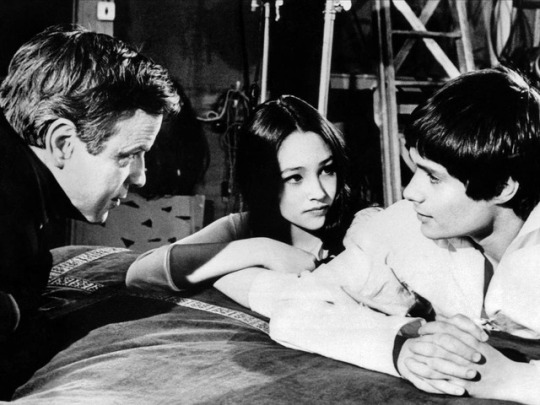
Franco Zeffirelli: Film and opera director who revelled in the lavish and theatrical
The last of Italy’s post-war cinema giants, Zeffirelli worked with many of the greatest stars of the 20th century
Tom Vallance - Saturday 15 June 2019
Franco Zeffirelli, who described his style as “lavish in scale and unashamedly theatrical”, was one of the most influential, flamboyant and controversial designer-directors of the 20th century. His Florentine background and love of the Renaissance permeated his diverse work, which encompassed theatre, cinema and his greatest love, opera.
Initially an actor, then designer of sets and costumes, Zeffirelli – who has died aged 96 – confounded his mentor and lover Luchino Visconti by successfully becoming a prolific director who triumphed at La Scala, Milan, with his first operatic production, then stunned Covent Garden with his vivid staging of Cavalleria Rusticana and Pagliacci. His Shakespearean productions at the Old Vic included a legendary version of Romeo and Juliet with Judi Dench, and a rapturously received Much Ado About Nothing with Maggie Smith, Albert Finney and Robert Stephens.
His best films were either Shakespearean or operatic ones, and included The Taming of the Shrew with Taylor and Burton, a Romeo and Juliet with two teenage unknowns, and Hamlet with Mel Gibson – plus a sumptuous film of La Traviata and a sweepingly dramatic, though drastically reshaped and cut, version of Verdi’s Otello with Placido Domingo. The treasured Covent Garden productions of Lucia di Lammermoor with Joan Sutherland and Tosca with Maria Callas were his work, and he created one of the most lavish opera productions ever seen with his Turandot at the Metropolitan.
On television his epic production Jesus of Nazareth has become a worldwide staple. He worked with both Olivier and Gielgud, and he gathered together an all-star cast for his film Tea With Mussolini, loosely based on his own childhood memories of the expatriate British ladies in Italy who helped raise him just before the Second World War. He also fought with the Italian resistance during the conflict, found God when he was nearly killed in a car accident with Gina Lollobrigida, and since 1960 had been heavily involved in right-wing politics, eventually becoming a member of the Italian senate, representing the Forza Italia party in 1996.
Born out of wedlock in Florence, Italy in 1923, his surname was the result of an accident. Since his father would not acknowledge him, and his mother was married, he had to be given an invented name and his mother chose Zeffiretti, after the “little breezes” of an aria in Cosi Fan Tutte, but it was misspelt in the register as Zeffirelli. He was raised by a peasant woman for two years, then after his mother was widowed she took him into her family, but her death when Zeffirelli was six years old resulted in his being passed to his father’s cousin, Aunt Lide.
His initial ambition was to be an architect, but Lide’s lover Gustavo was an amateur baritone, and he introduced the boy to opera and the cinema, both of which were to be life-long passions. He later described his reaction to his first opera, Die Walkure, as “hardly a refined appreciation, more like a child of today gawping at Star Wars”.
He had his first real taste of theatre when, while fighting with the partisans in the Second World War, he met the music and ballet expert Richard Buckle and helped him stage a troop show. Seeing Olivier’s film of Henry V chrystallised Zeffirelli’s ambition. He recalled: “I knew then what I was going to do. Architecture was not for me; it had to be the stage. I wanted to do something like the production I was witnessing.”
After the war, he was working as an assistant scenic painter when he met the man he described as “probably the single most important person I have ever known”, the director Luchino Visconti. On their first meeting backstage he told Visconti that he was an actor, to which Visconti replied: “So you should be, with your looks.”
Visconti gave the youth small parts in his stage productions of Crime and Punishment (1946) and Eurydice (1947), and he made his screen debut in Luigi Zampa’s L’Onorevole Angelina (1947) starring Anna Magnani, after which Visconti used Zeffirelli and Francesco Rosi as his assistants on his film La Terra Trema (1948), filmed on location with a cast of Sicilian fishermen, and distinguished by its superb photography. Said Zeffirelli: “This is my main debt to Luchino in filmmaking: his passionate attention to detail. Everything was always researched to a point far beyond the needs of the actual scene. You immersed yourself in the period, the place, its culture, so that even though the audience might not take in every detail they would be absolutely convinced of its essential ‘rightness’.”
For a production of As You Like It (1948) Visconti hired Salvador Dali as designer but, when the surrealist’s plans proved impractical, Visconti asked Zeffirelli to help out. He then gave Zeffirelli the first work for which he was independently credited, as designer of Tennessee Williams’ A Streetcar Named Desire (1949).
Visconti and Zeffirelli were now living together in Rome, but worked separately for a spell before reuniting for the film Bellissima (1951) starring Anna Magnani, on which Zeffirelli again served as an assistant. After working briefly with Rossellini and Antonioni, he designed one of Visconti’s greatest theatrical triumphs, a production of Chekhov’s Three Sisters (1952), and worked as his assistant on the film Senso (1954), but the often stormy relationship of the two men was coming to an end.
When Zeffirelli was asked to design a production of Rossini’s L’Italiana in Algeri at La Scala, he saw it as an opportunity to break with the world of Roman theatre. With its cast clad mainly in light blues and whites, the sunny production of 1953 was rapturously received and the manager of La Scala, Antonio Ghiringhelli, decided to follow it with La Cenerentola (1954) with the same creative team.
But director Corrado Pavolini had fallen ill, and Zeffirelli, with the backing of Simionato, asked if he could be both director and designer. The result was another great success, and the director’s first experience of handling a large chorus.
Zeffirelli was immediately asked to direct two productions the following season, Donizetti’s L’Elisir d’amore and Rossini’s Il Turco in Italia (both 1955). He was also told that Maria Callas wanted to sing Donna Fiorilla in the Rossini and had specifically asked that he should direct it.
Zeffirelli had first met Callas when As You Like It had been running in Rome at the same time as Parsifal, in which Callas sang the role of Kundry. Tullio Serafin, who was a major influence on Zeffirelli, introduced both him and Visconti to “this very plump Greek-American girl with a terrible New York whine allied to a rather prim, matronly manner. She sounded awful and looked worse.” Then she had sung, and Zefirelli had been entranced. “I followed her to Florence to see her Traviata and hung around her dressing room like a lovesick boy,” he recalled.
Zeffirelli would shortly realise his longstanding ambition to direct a film. Camping (1957) was a modest, sentimental story of two young lovers on a motorcycle, but the public liked it. He was then called back to Dallas, Texas, to stage La Traviata for Callas, and succeeded in eclipsing Visconti’s previous staging with an audaciously cinematic production, using multiple sets and dispensing entirely with the interval between the second and third acts.
At the end of 1959 Zeffirelli was invited back to Covent Garden to create new productions of Cavalleria Rusticana and Pagliacci, which were to prompt the Old Vic to ask him to direct Romeo and Juliet, with the particular request that he reproduce the Mediterranean feeling of his opera productions. For this Zeffirelli was determined to use a truly youthful leading pair and cast two young players starting out, Judi Dench and John Stride. “Judi was small and doll-like and looked even younger than her age, just the way I’d always imagined Juliet should be,” he said. The production, so different from all previous accounts of Shakespeare’s tragedy – the director even replaced the balcony with battlements – was loathed by London’s theatre critics next day, who condemned the acting, the sets and the direction. But the following Sunday London’s most respected critic, Kenneth Tynan, called it “a revelation, even perhaps a revolution ... The Vic has done nothing better for a decade.” Romeo and Juliet immediately became a sell-out and extended the length of its season.
The following year, 1961, Zeffirelli directed Fastaff at Covent Garden, then made his debut at Glyndebourne with L’Elisir d’amore. In Dallas, he staged a controversial Don Giovanni with Joan Sutherland and Elizabeth Schwarzkopf, setting the opera in the burnt-out aftermath of a catastrophe, then returned to England to create an Othello for the Royal Shakespeare Company at Stratford. It turned out disastrously. Wanting an elegant, cultured Othello, he cast John Gielgud, with young Ian Bannen as Iago. “Whatever chemistry makes a director and his actors work was missing with us three ... Gielgud and Bannen were like oil and water and somehow Gielgud and I never seemed to react together.” A few months later the Old Vic Romeo and Juliet opened in New York and was a critical and commercial triumph, with Zeffirelli receiving a special Tony Award for design and direction.
In 1967 he directed his first major film, The Taming of the Shrew (1967), starring Elizabeth Taylor and Richard Burton, and described by one critic as “a mixture of classical Shakespeare, the Marx brothers and a Renaissance painting”. It was a great success, and Zeffirelli followed it with Romeo and Juliet (1968), starring newcomers Leonard Whiting and Olivia Hussey. Writer Bruce Robinson, who played Benvolio in the film, later claimed that Zeffirelli tried to seduce him, and that he was the model for the lecherous Uncle Monty in Robinson’s 1987 film Withnail and I.
Given a small budget by Paramount, Romeo and Juliet made $50m – the highest ratio of investment to earnings in the history of the studio. “The effect on me was stunning,” he said. “It made me a lot of money, transforming me from someone who’d always lived at the limits of his income to someone who could be described as rich, and it elevated me from being a European celebrity to someone who was famous internationally.”
A few months later Zefferelli was critically injured when the car he was in, driven by Gina Lollobrigida, skidded and smashed into a barrier, sending him through the windscreen. Months of facial surgery preceded his return to work with a triumphant staging of Pagliacci and Cavalleria Rusticana at the Metropolitan. His accident had delayed his plans to film the life of Francis of Assissi, which he thought relevant to the “peace and love” movement of the Sixties. Titled Brother Sun, Sister Moon, the film appeared in 1972 and was criticised as simplistic and naive.
In 1975 Zeffirelli embarked on a project that would take two years to complete – an ambitious television miniseries based on the life of Christ, titled Jesus of Nazareth. Featuring a starry cast supporting Robert Powell as Jesus and Olivia Hussey as Mary, the series was screened worldwide over Easter and was given the exceptional accolade of a mention by the Pope in his Psalm Sunday message.
Zeffirelli next staged Alfred de Musset’s Lorenzaccio for the Comedie Francaise, and a triumphant Otello at La Scala (both 1976). Starring Placido Domingo, Mirella Freni and Piero Cappuccilli, with Carlos Kleiber conducting, Otello was the first La Scala premiere to be televised live.
A second de Filippo play, Filumena, was another hit for the National, after which Zeffirelli went to Hollywood. Though his films The Champ (1979) and Endless Love (1981) attracted audiences, they were decried by critics.
Returning to La Scala in 1981 to stage Cavelleria Rusticana and Pagliacci, both starring Domingo, Zeffirelli filmed both productions, partly in the opera house and partly on location in Sicily. When shown on television in the US, Pagliaci won both a Grammy and Emmy. Teresa Stratas, the film’s soprano, then starred in La Boheme for Zeffirelli at the Metropolitan, and he realised he had the perfect star for a filmed version of La Traviata. When Jose Carreras declined to play Alfredo, Domingo accepted the role.
Visually entrancing, and extremely moving, La Traviata is one of the finest opera films. The film version of Otello is comparable in its power and spectacle, though marred for purists by some drastic cutting.
In 1985 Zeffirelli designed his first ballet, Swan Lake, for La Scala, his revolutionary approach – particularly his replacement of tutus with calf-length dresses for the ballerinas – causing Mikhail Baryshnikov to withdraw from the production. He then made a film his detractors seized on – a ludicrous account of Toscanini’s early years, Young Toscanini (1988). The director was happier with an impressive Hamlet (1990) starring Mel Gibson, and a television film of Don Carlos (1992). But a version of Jane Eyre (1996) suffered from the mismatching of its leads, Charlotte Gainsbourg and William Hurt.
The cast of Tea With Mussolini (1999) was high-powered, including Maggie Smith, Judi Dench, Joan Plowright, Lily Tomlin and Cher, and made Zeffirelli’s labour of love watchable if unsatisfying.
His last films were Callas Forever (2002), a dramatisation of the singer’s last years, and Tre Fratelli (2005). In 2003 he was nominated for a Laurence Olivier Award for his set designs for Absolutely! (Perhaps), and in November 2004 he was given an honorary knighthood.
In 2009, he was awarded the inaugural Premio Colesseo, which is given to those who have enhanced Rome’s reputation.
Franco Zeffirelli, film and opera director, born 12 February 1923, died 15 June 2019
https://www.independent.co.uk/news/obituaries/franco-zeffirelli-obituary-film-theatre-director-italy-romeo-and-juliet-tosca-maria-callas-a8959971.html
2 notes
·
View notes